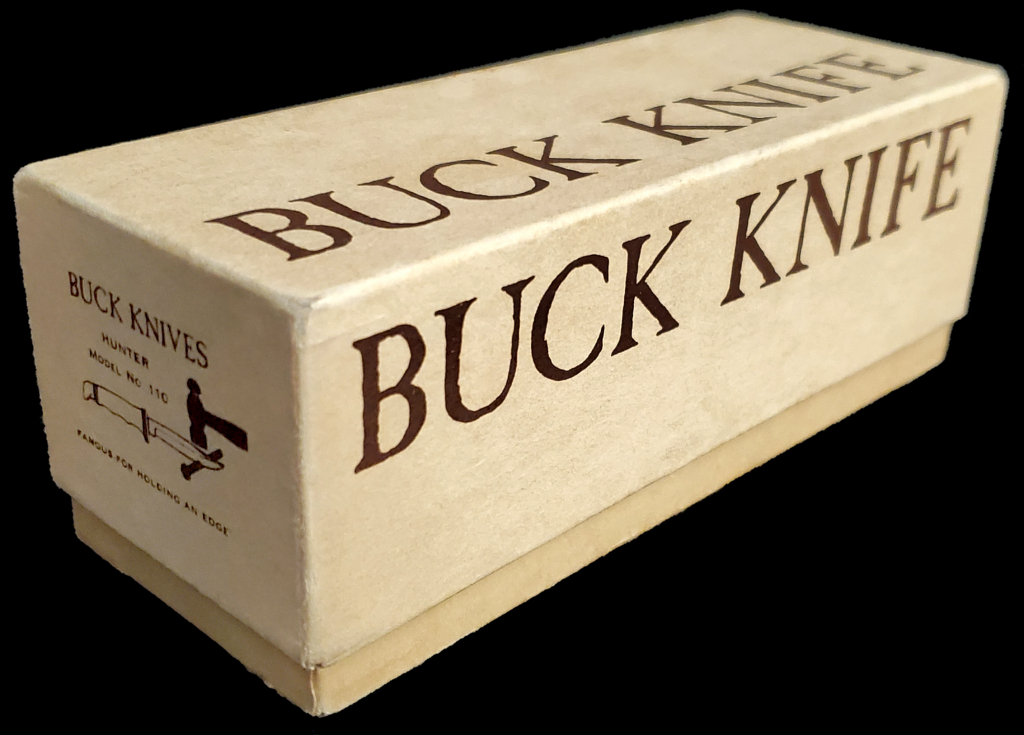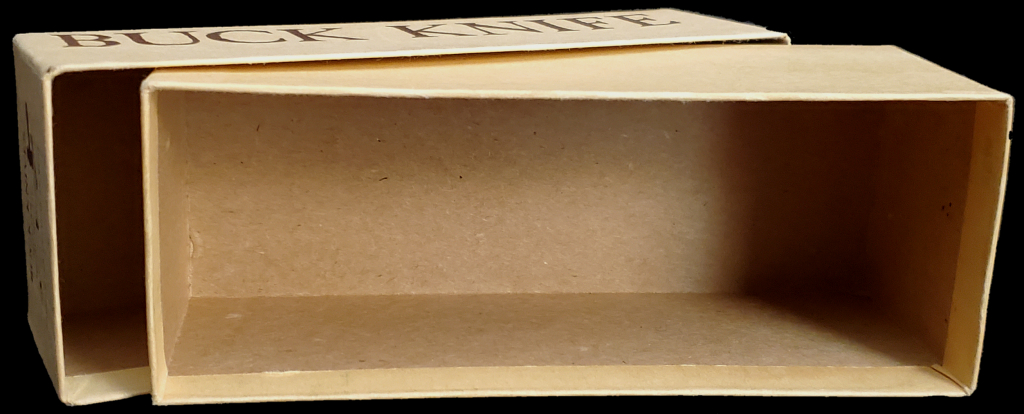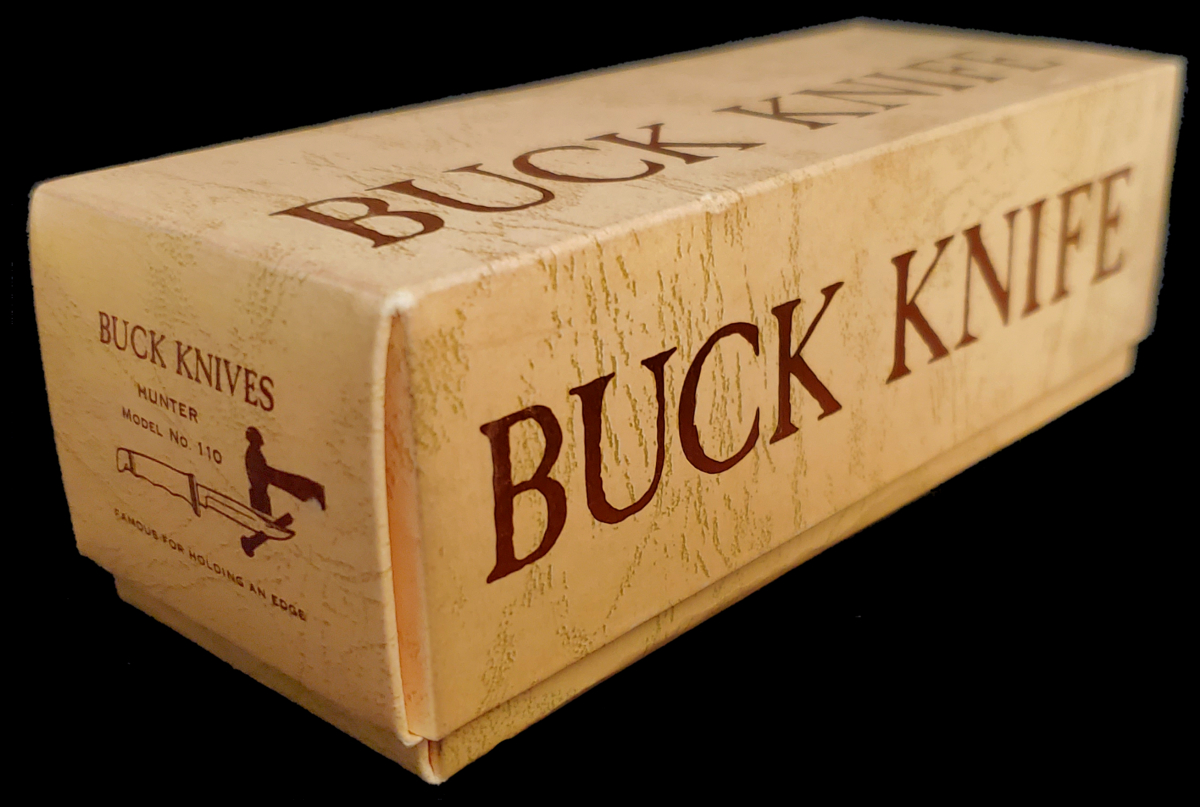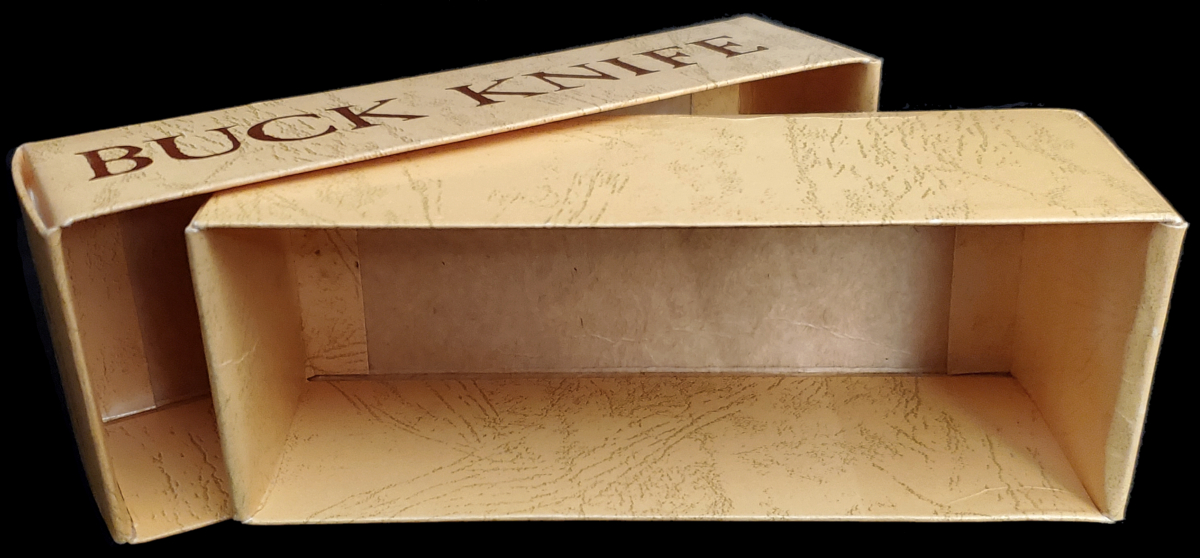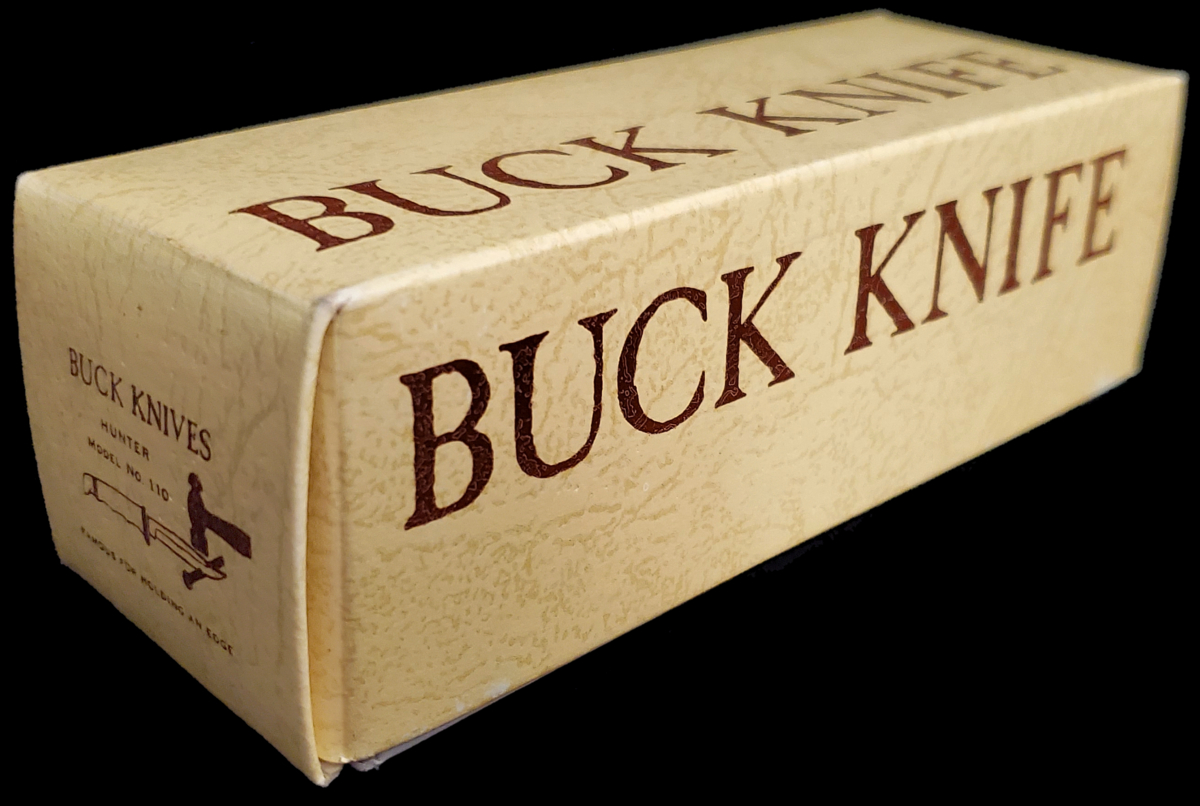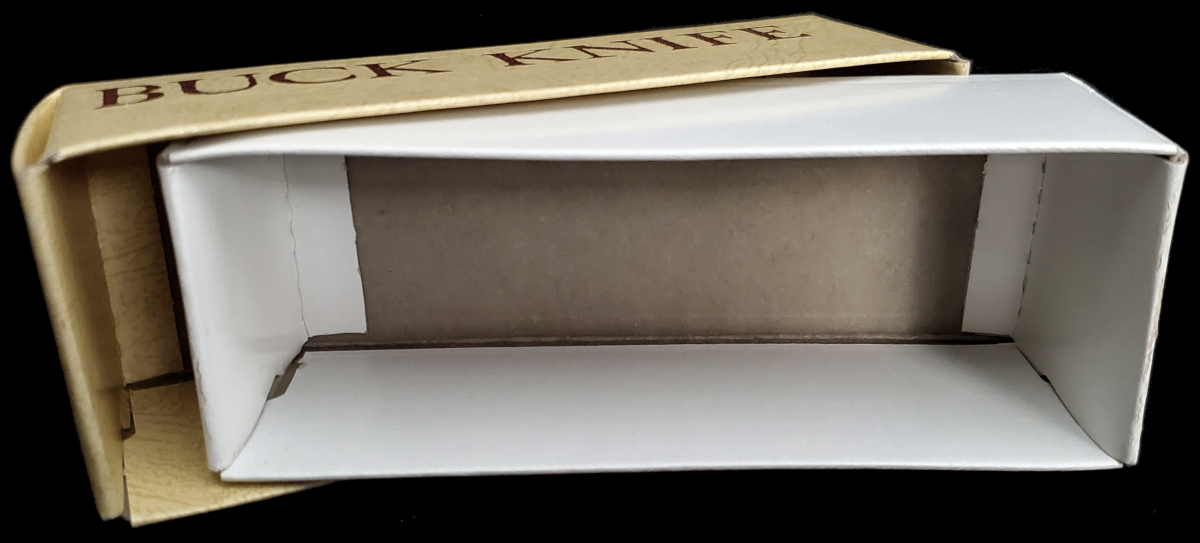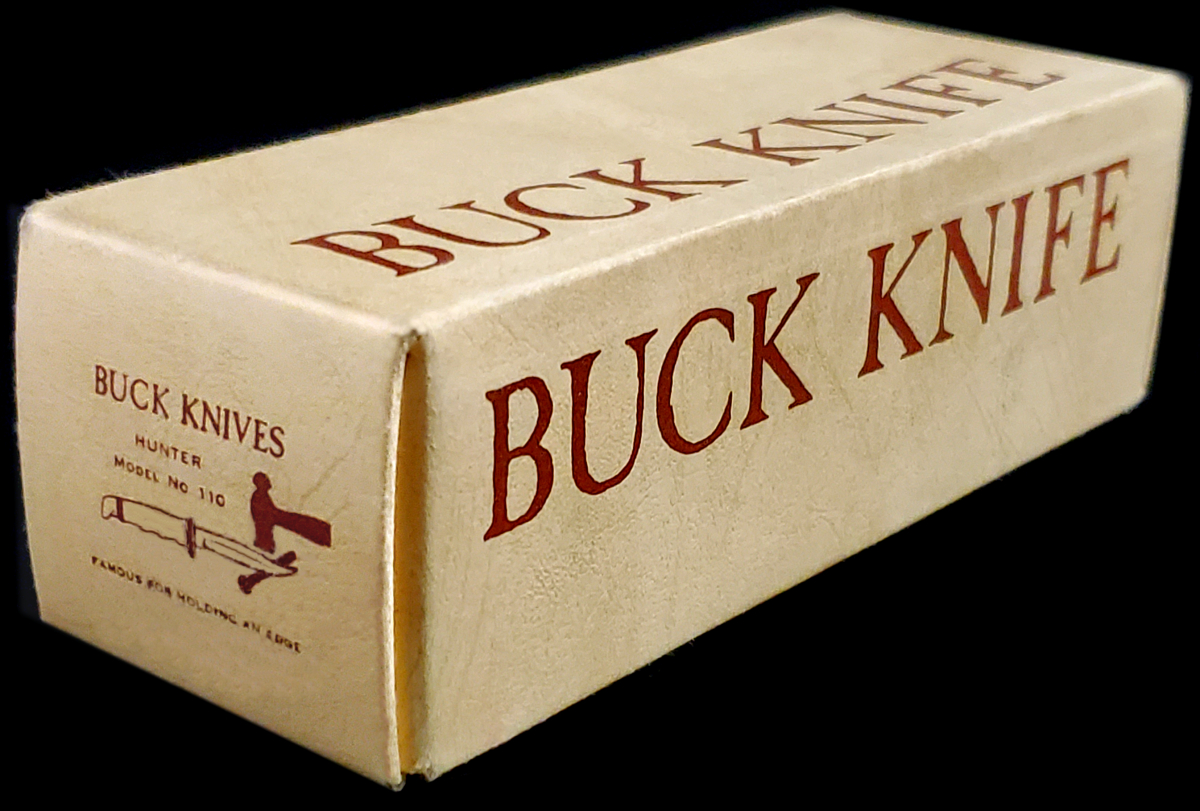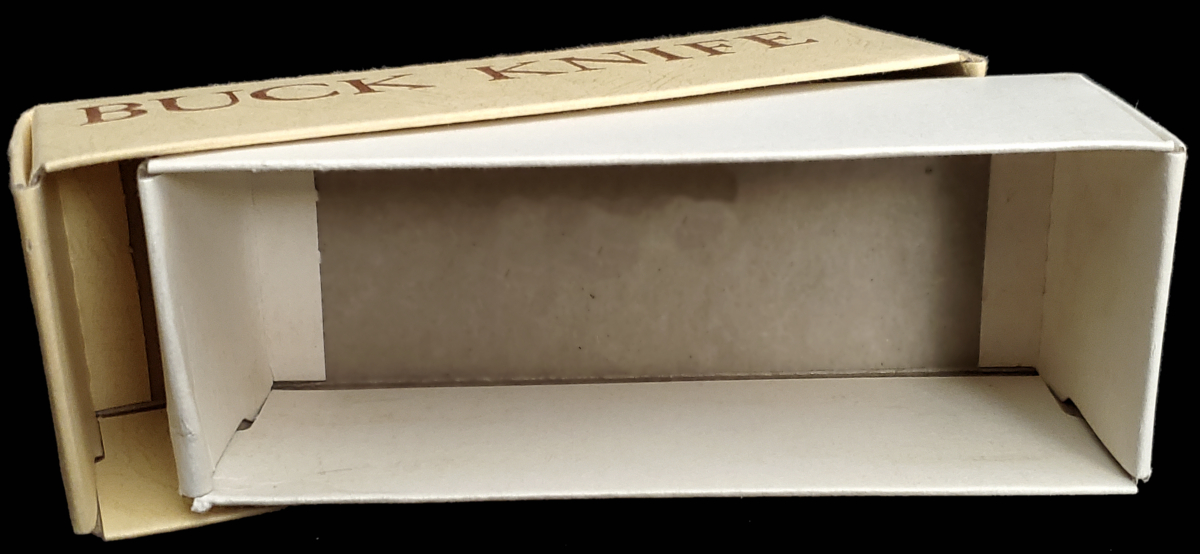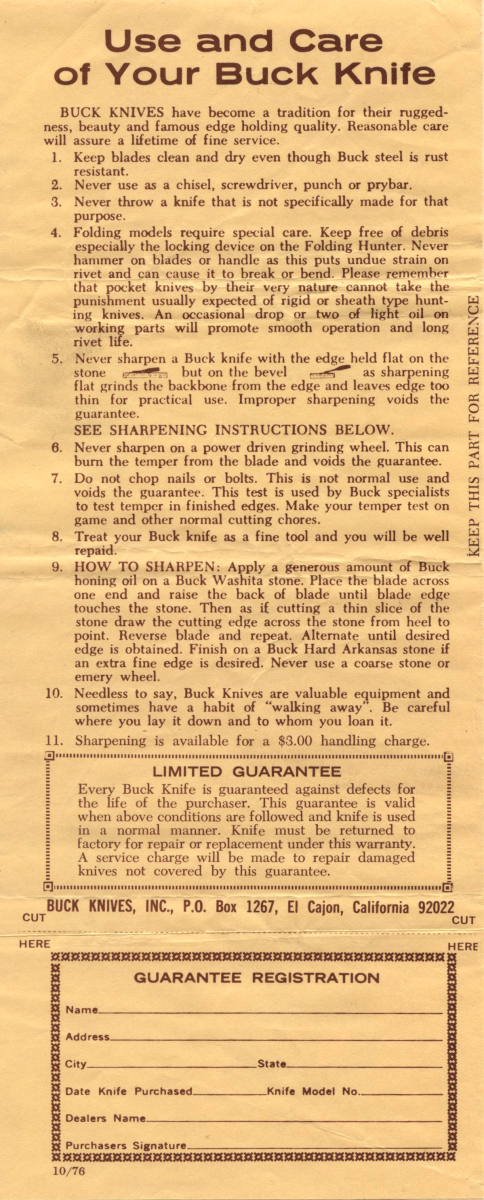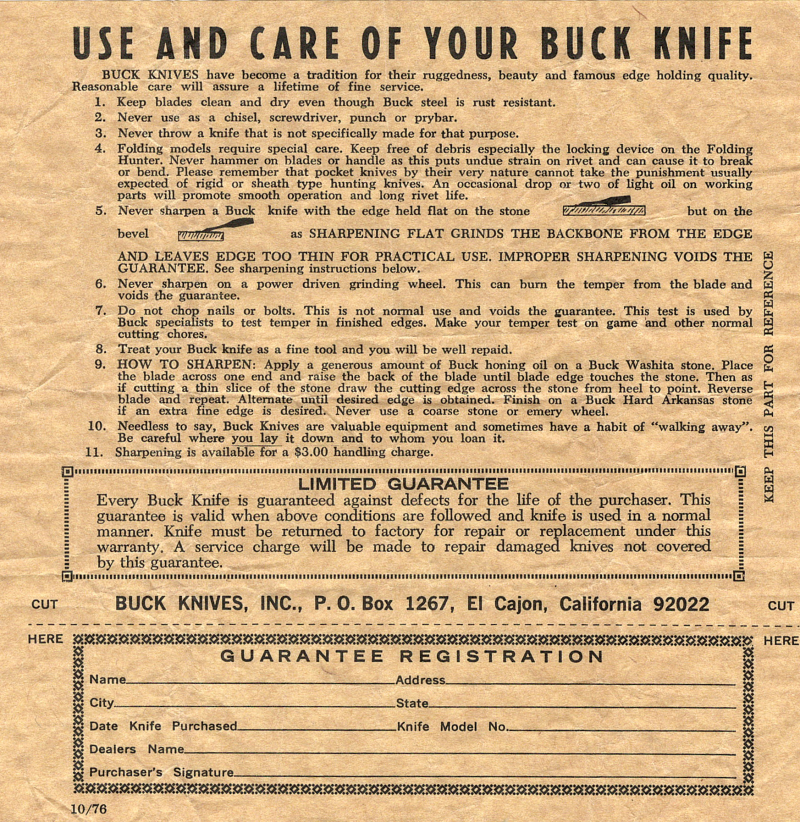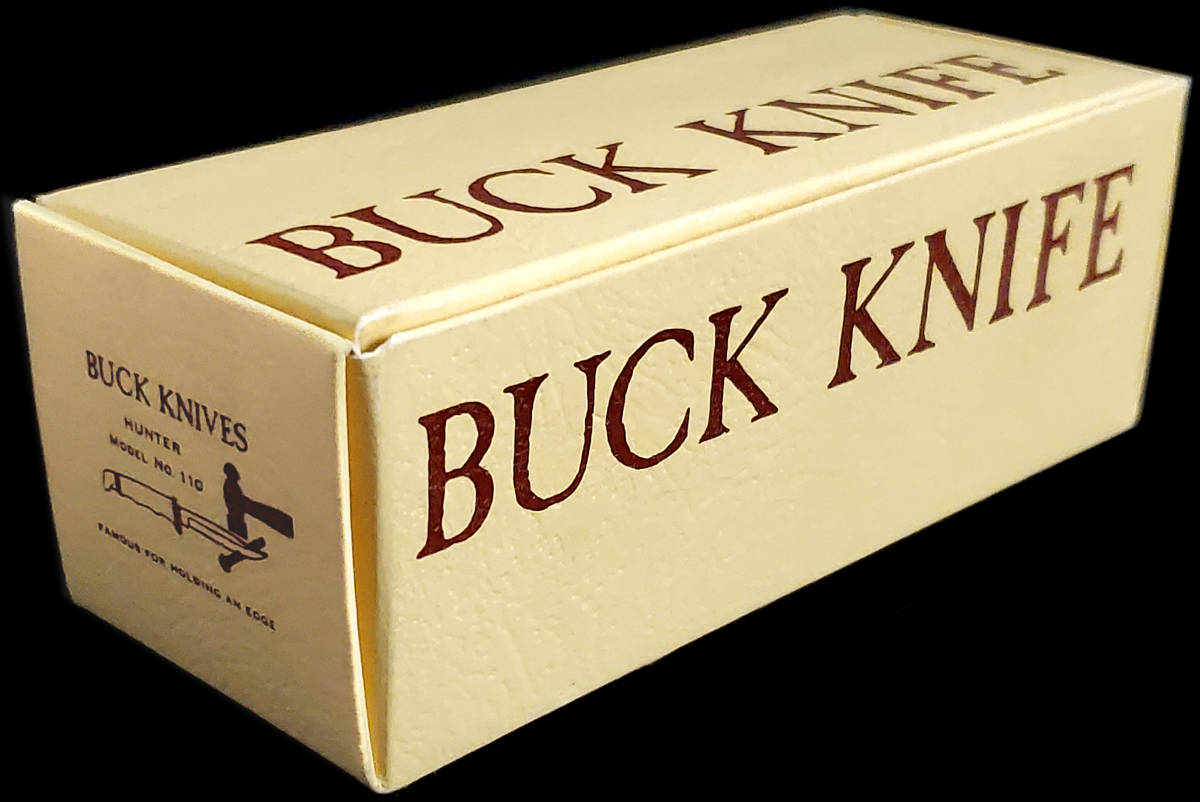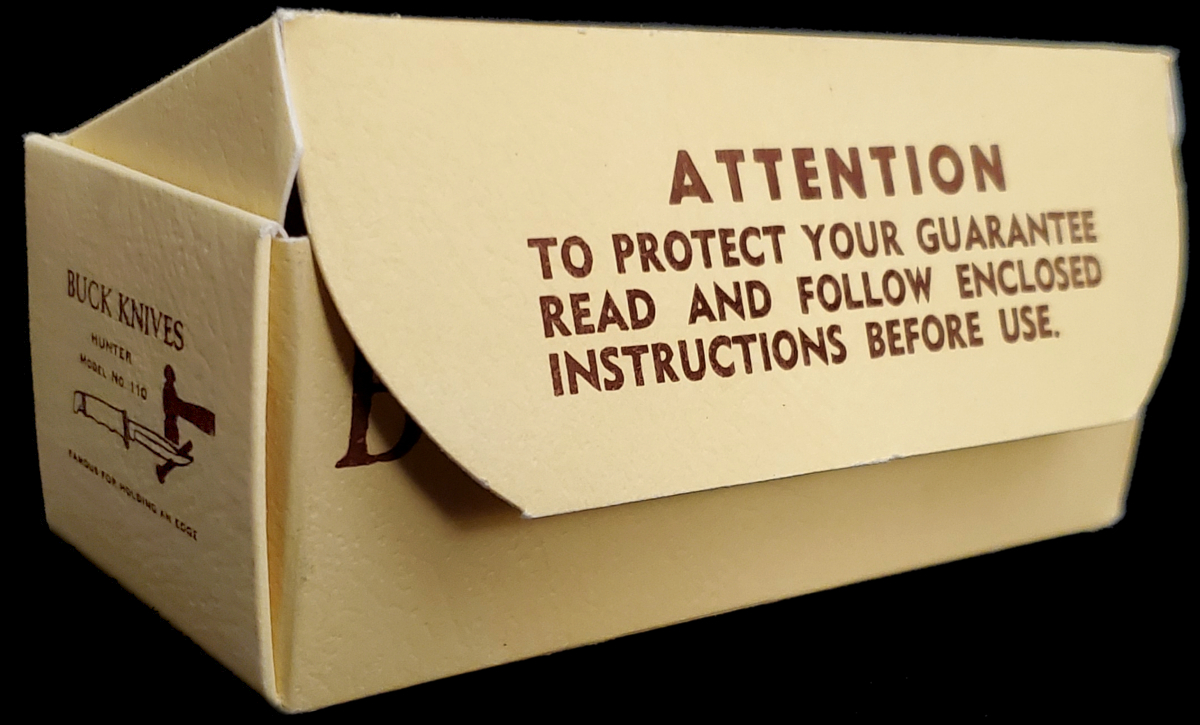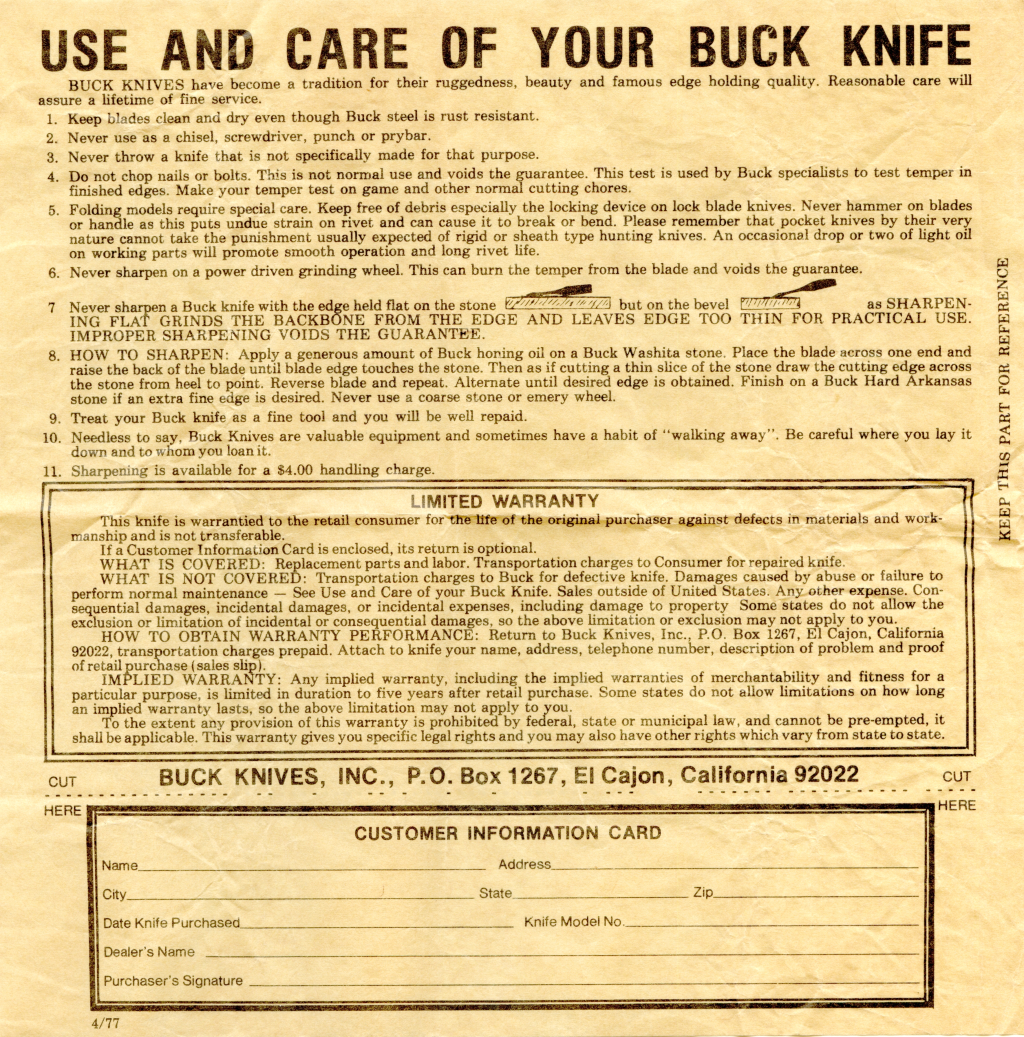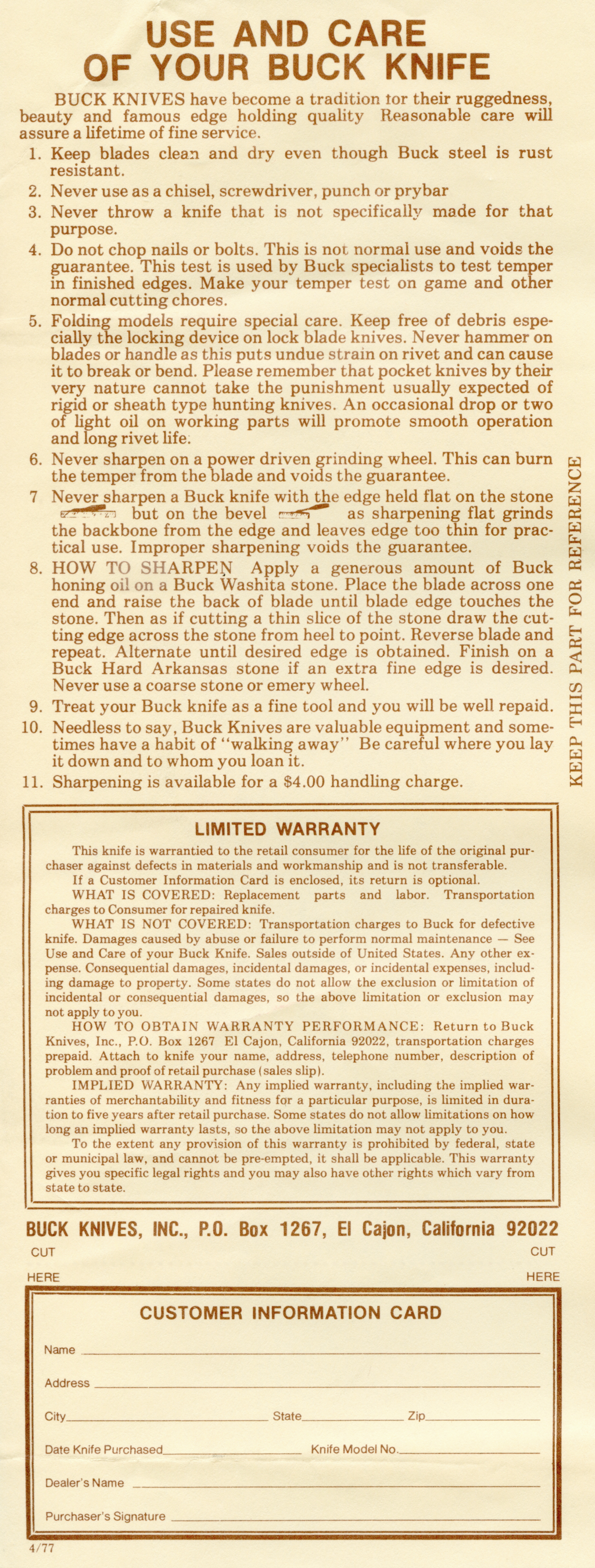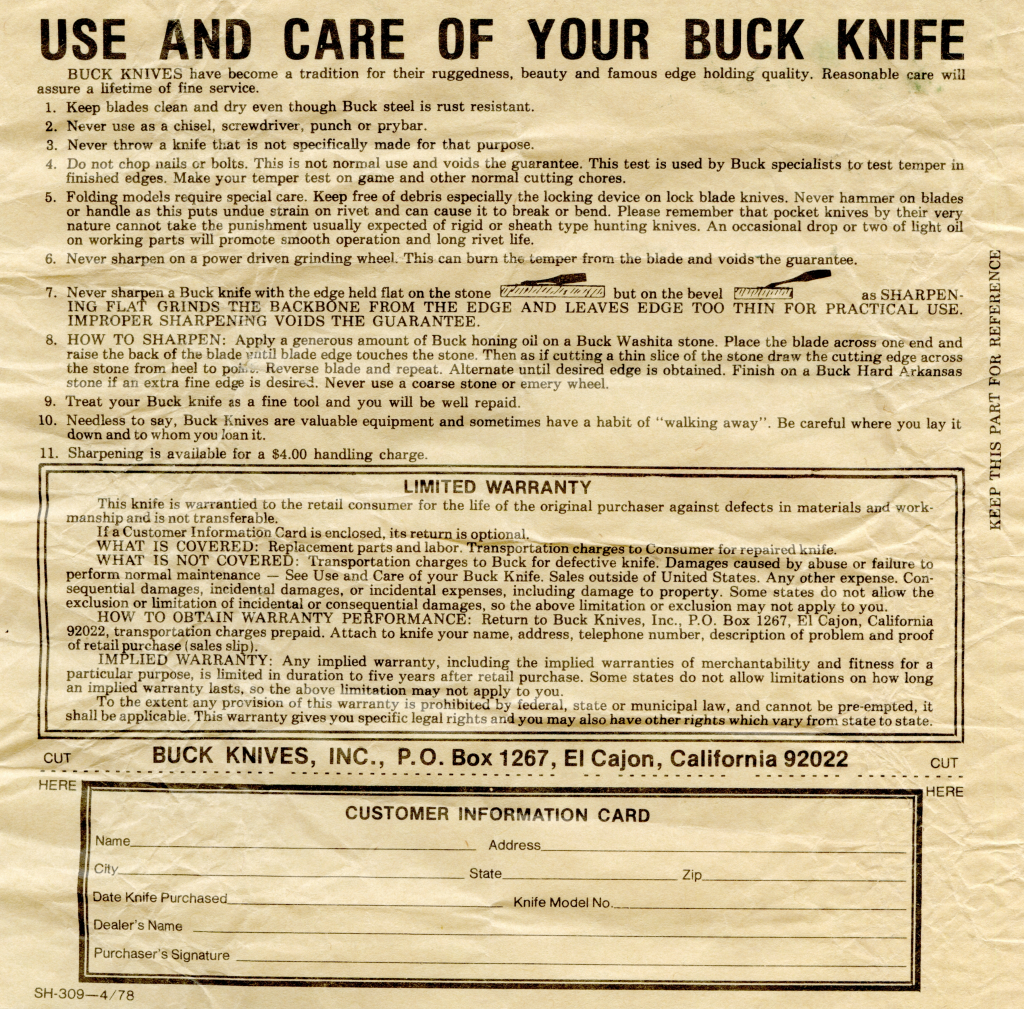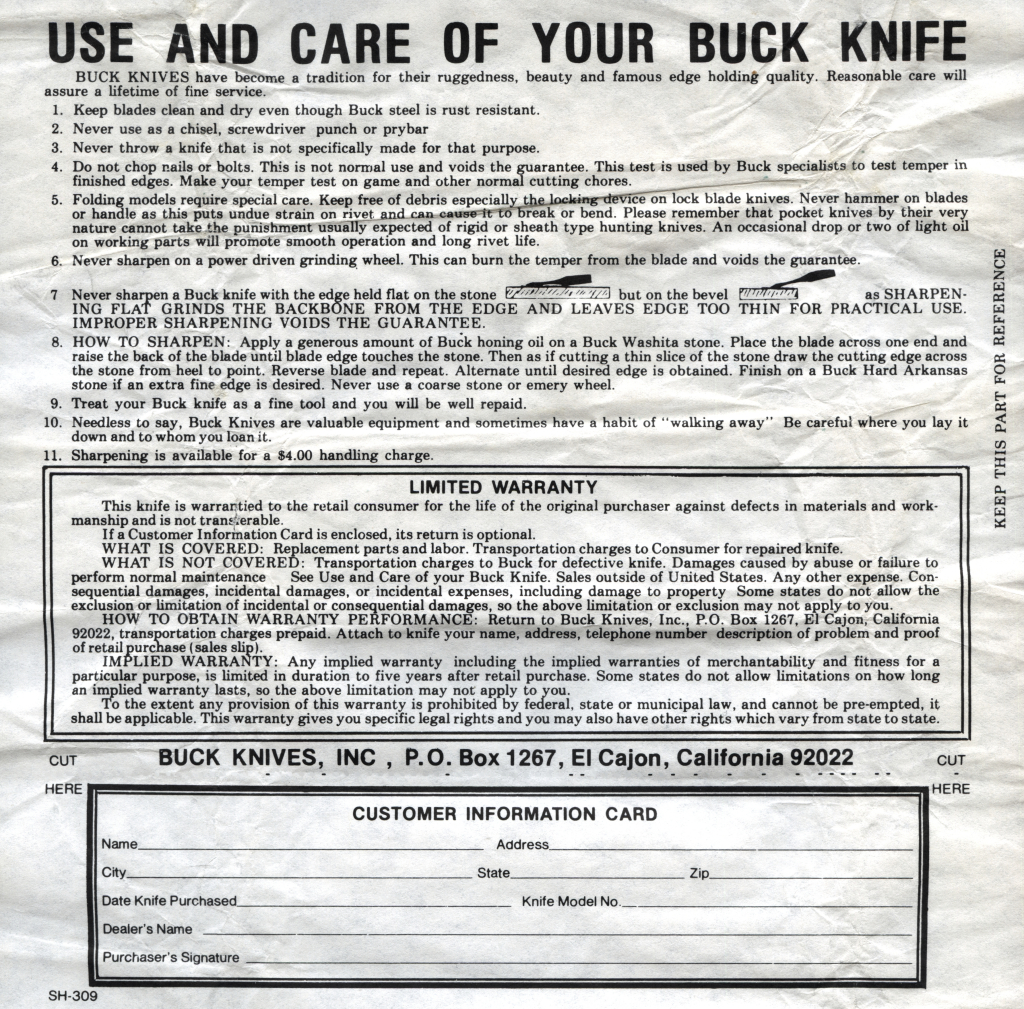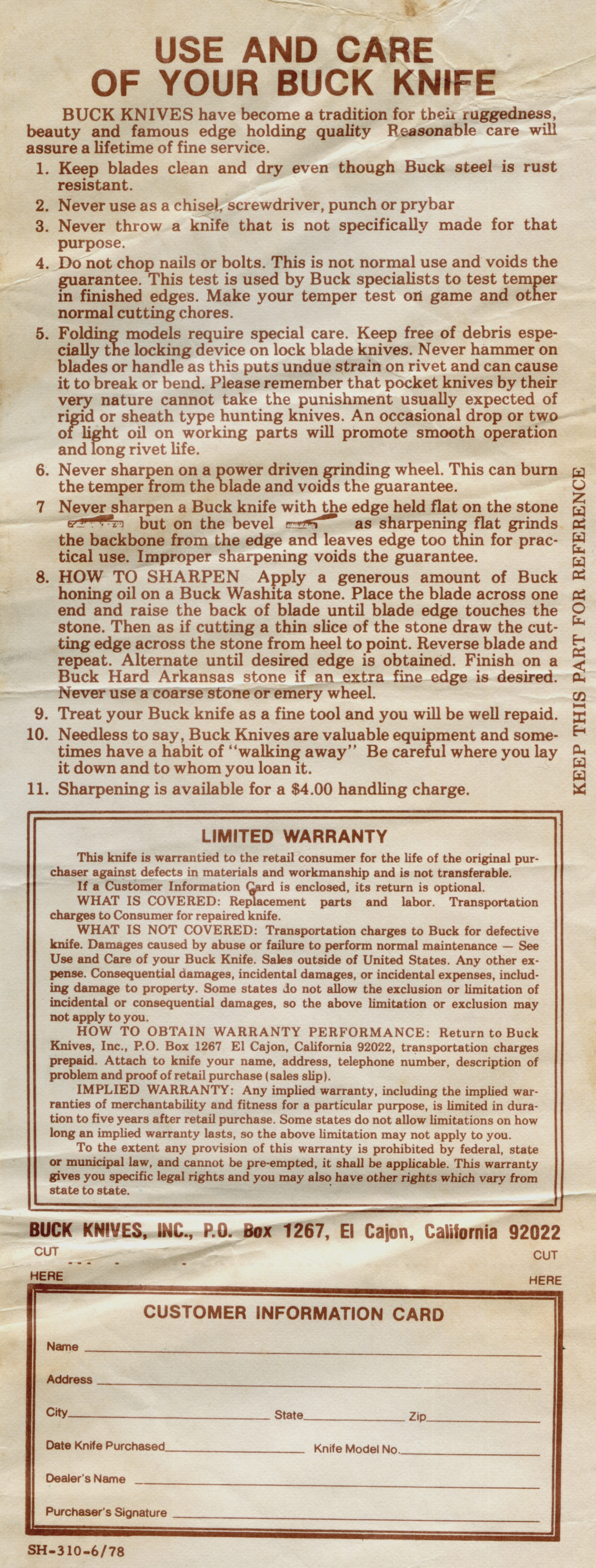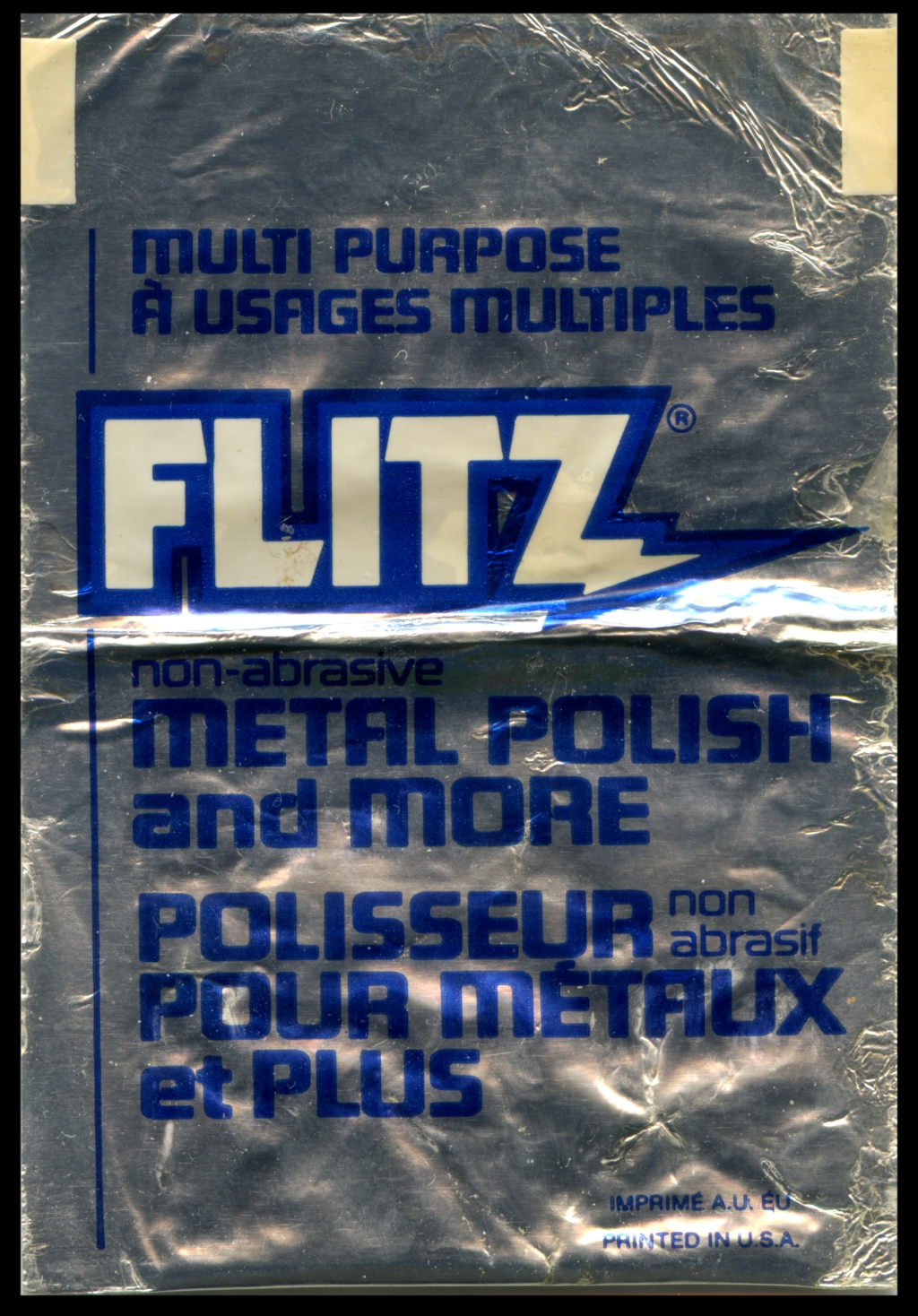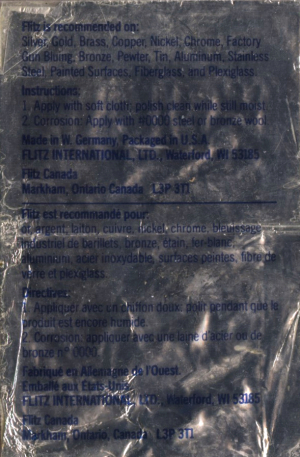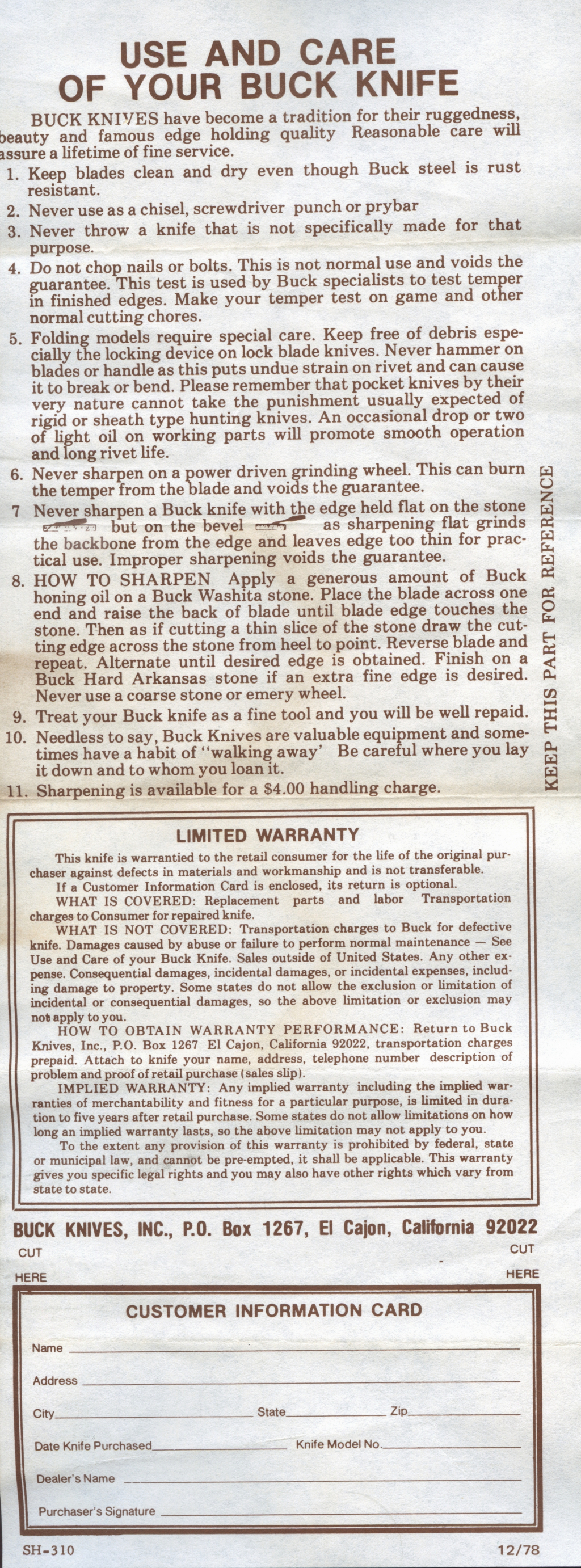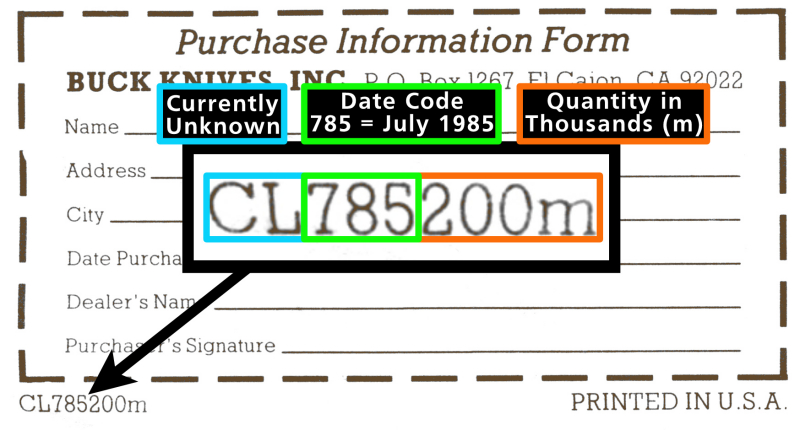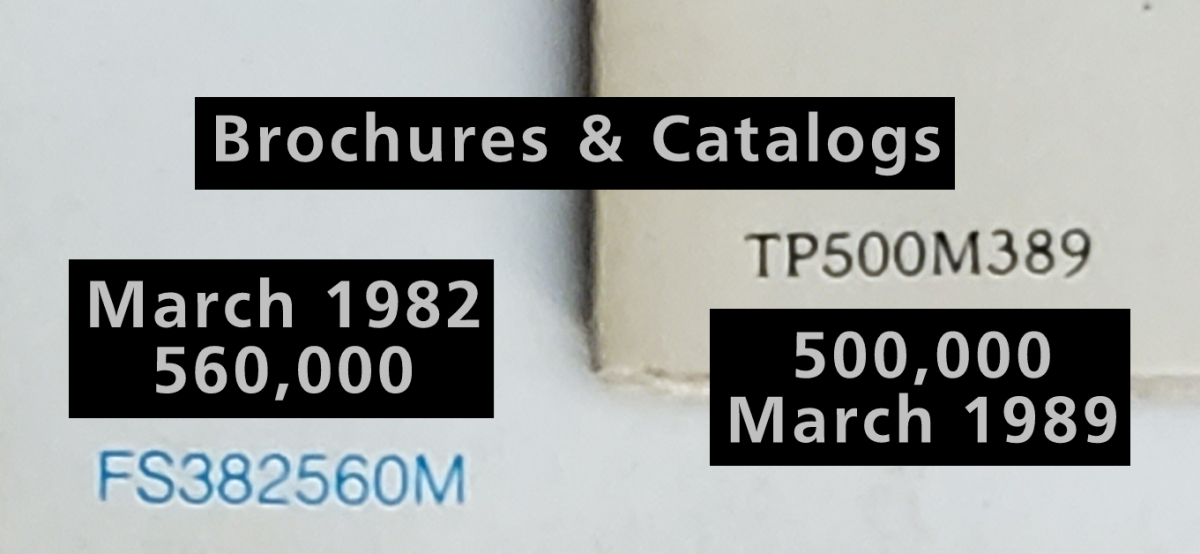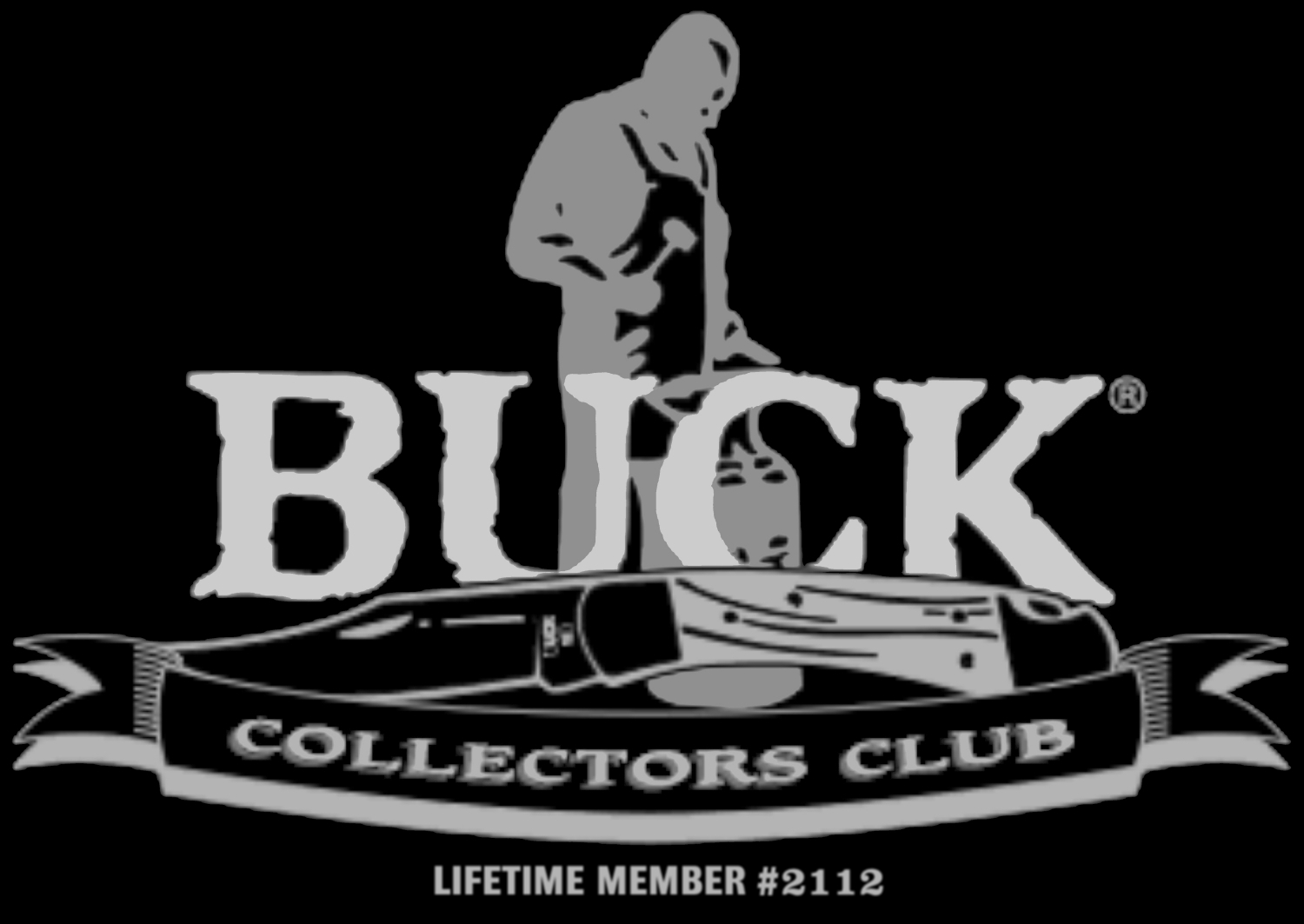 |

| A
photographic history by Michael DF Lowe |

...
with appreciative contributions from
Vern Taylor, George Stinzel, and
Joe Houser |
|


Produced 1967 through 1969 while
first
located in the Federal Boulevard factory in San Diego, California.
In
late 1969, production was moved to the newly built North Magnolia
Avenue factory
in El
Cajon, California.
The
version
identifier is the integrated brass spring holder, cast as part
of
the right frame butt and
bolster and visible by a very thin off-centered line. The variation is
identified
by the inverted
BUCK logo stamped on the left side blade tang and the bolster
stud/rivet
locations
listed
below each knife. The 'USA' was added to the logo stamp in
late 1967
for
export sales going to
Canada.
The
frames
were cast in brass. The satin finished clip point blade is made of 440C
hand-rolled
steel. The inlays are Macassar Ebony imported from Indonesia.
|
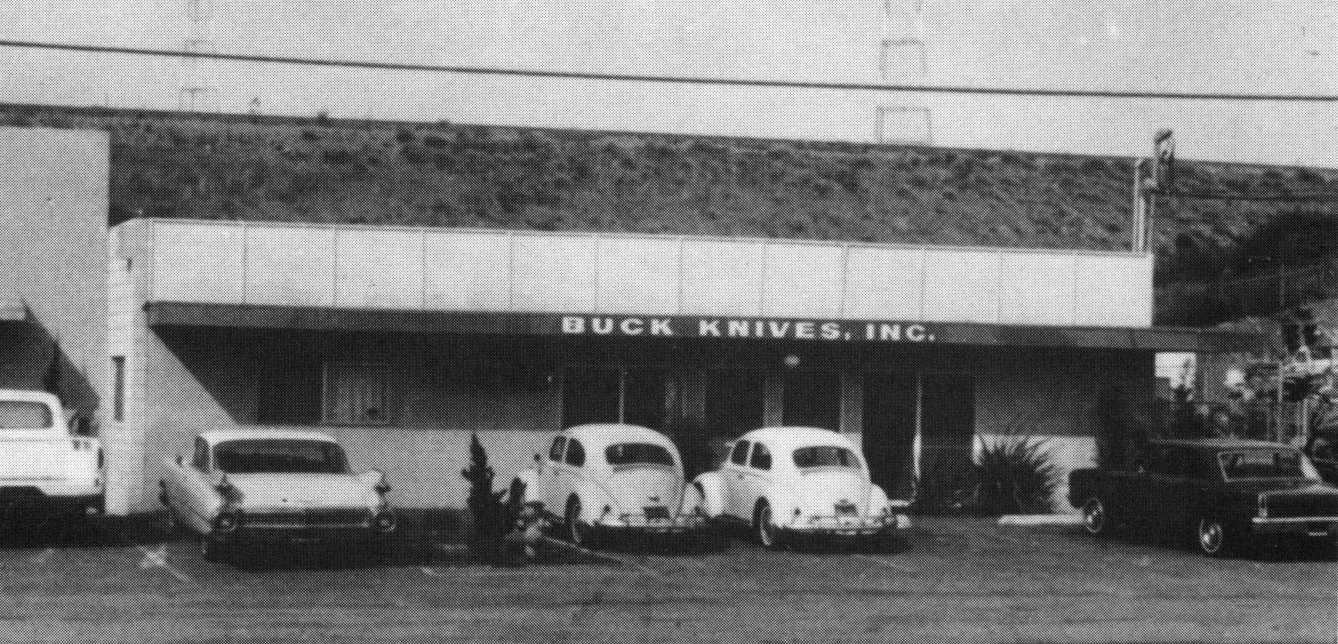
| Federal Boulevard Factory |
|
|

|
Variation
One (V3V1) 1967
Blade
Rivet: 1 visible on both bolsters. ~ Butt Studs: 2
visible on left bolster only.
Inlay Pins: 2 tiny, brass. ~ Rocker Rivet: Brass,
no
head. ~ GS:V2T1
Tang stamp has a dot after the BUCK* logo.
|
|
|
1/8"
x 1/4" integral assembly studs in right frame spring holder.
~ Integral brass spring
holder in right frame.
1/4" integral brass blade pivot bushing,
now with a 1/8" x 1/2" pass-thru rivet. ~ Independent
steel spring.
|
|
|

|
Variation
Two (V3V2) 1967
Blade
Rivet: 1 visible on both bolsters. ~ Butt Studs: 2
visible on left bolster only.
Inlay Pins: 2 tiny, brass. ~ Rocker Rivet: Brass,
no
head. ~ GS:V2T2
|
|
|
|

|
Variation
Three (V3V3) 1967
Blade
Rivet: 1 visible on both bolsters. ~ Butt Studs: 2
visible on left bolster only.
Inlay Pins: 2 tiny, brass. ~ Rocker Rivet: Brass,
no
head. ~ GS:V2T3
|
|
|
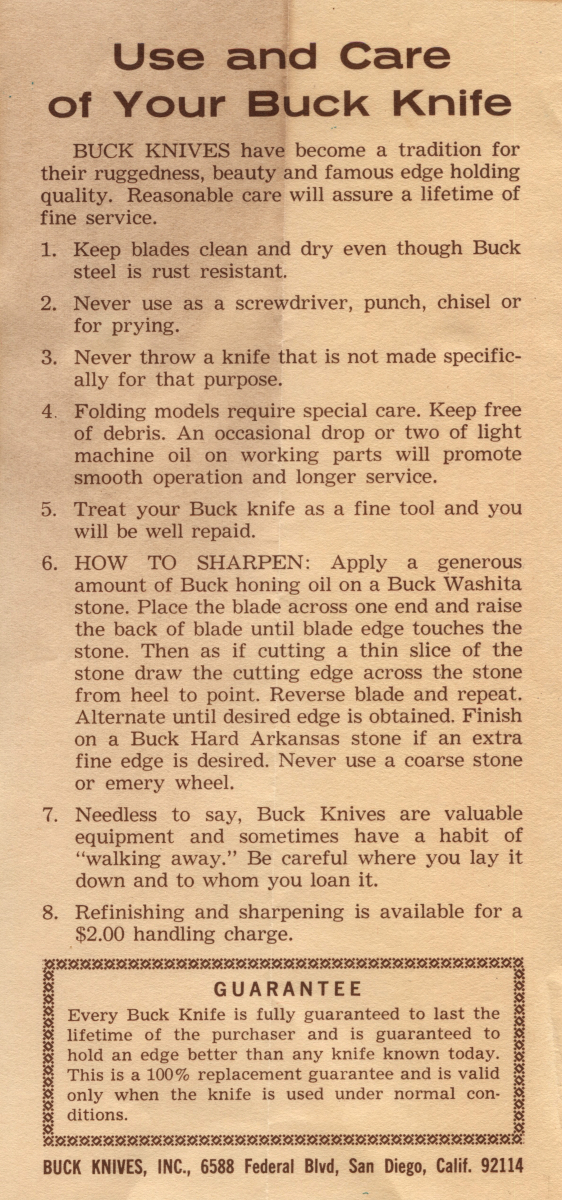
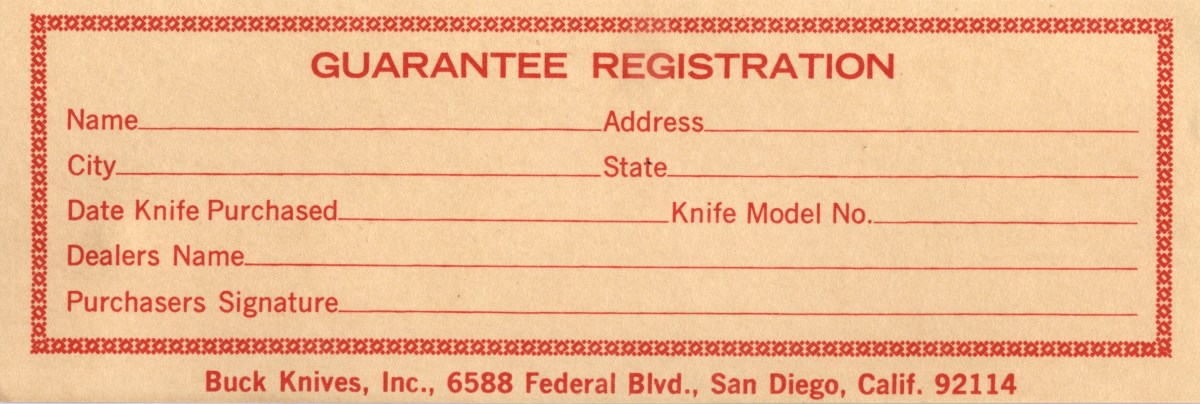
|
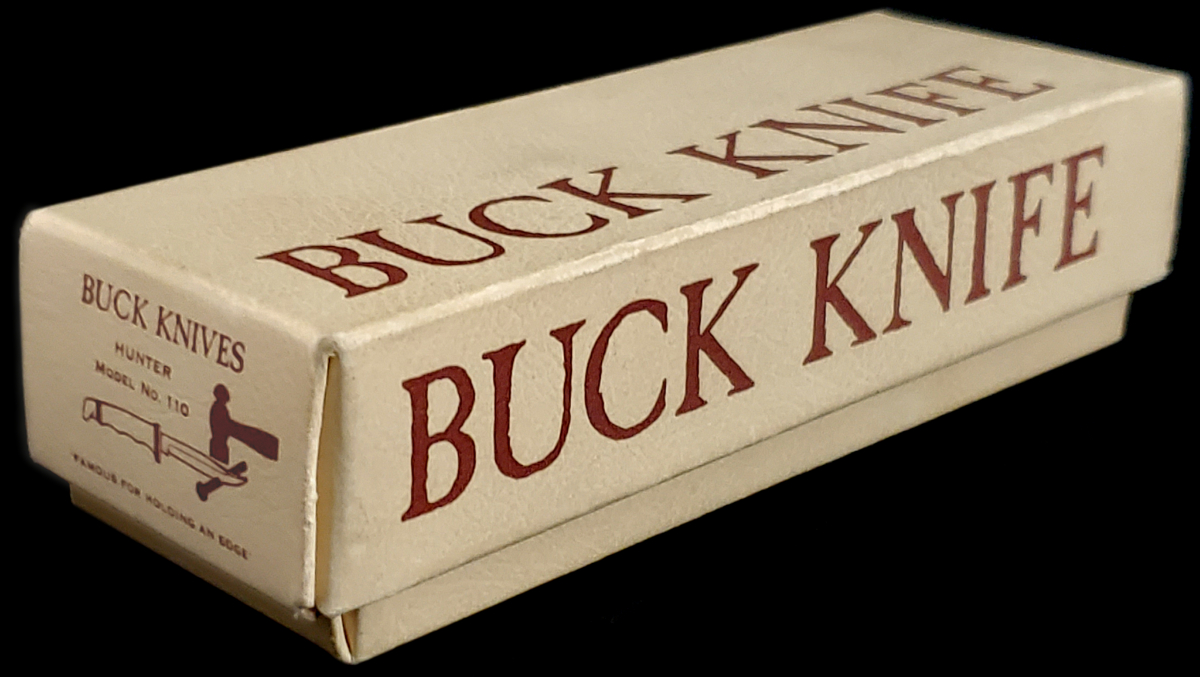
1966 - 1968
San
Diego Paper Box Co. ~ 2 pieces, 1-1/2" tall |
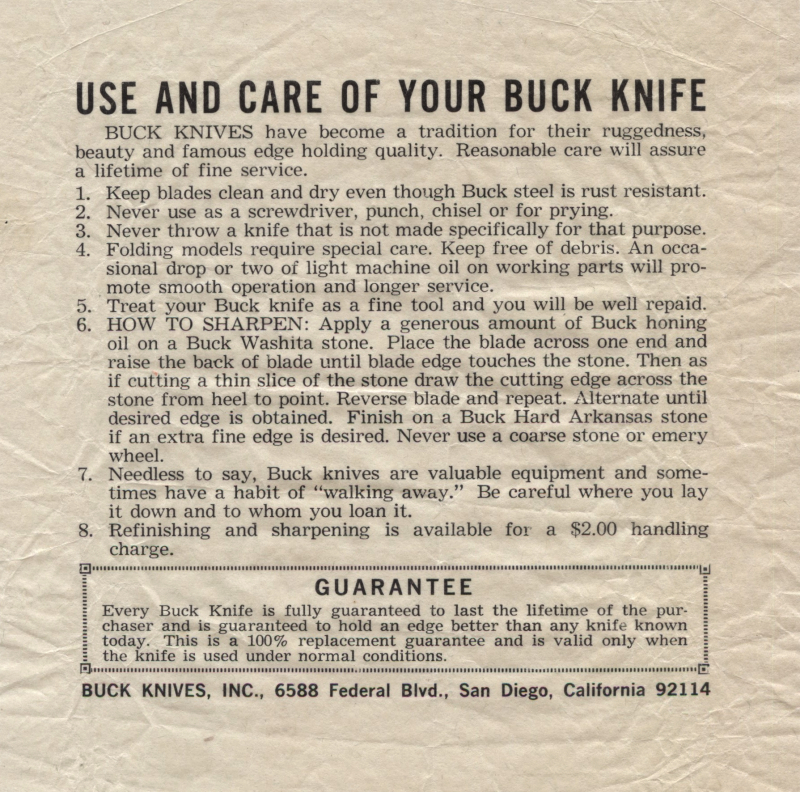
|
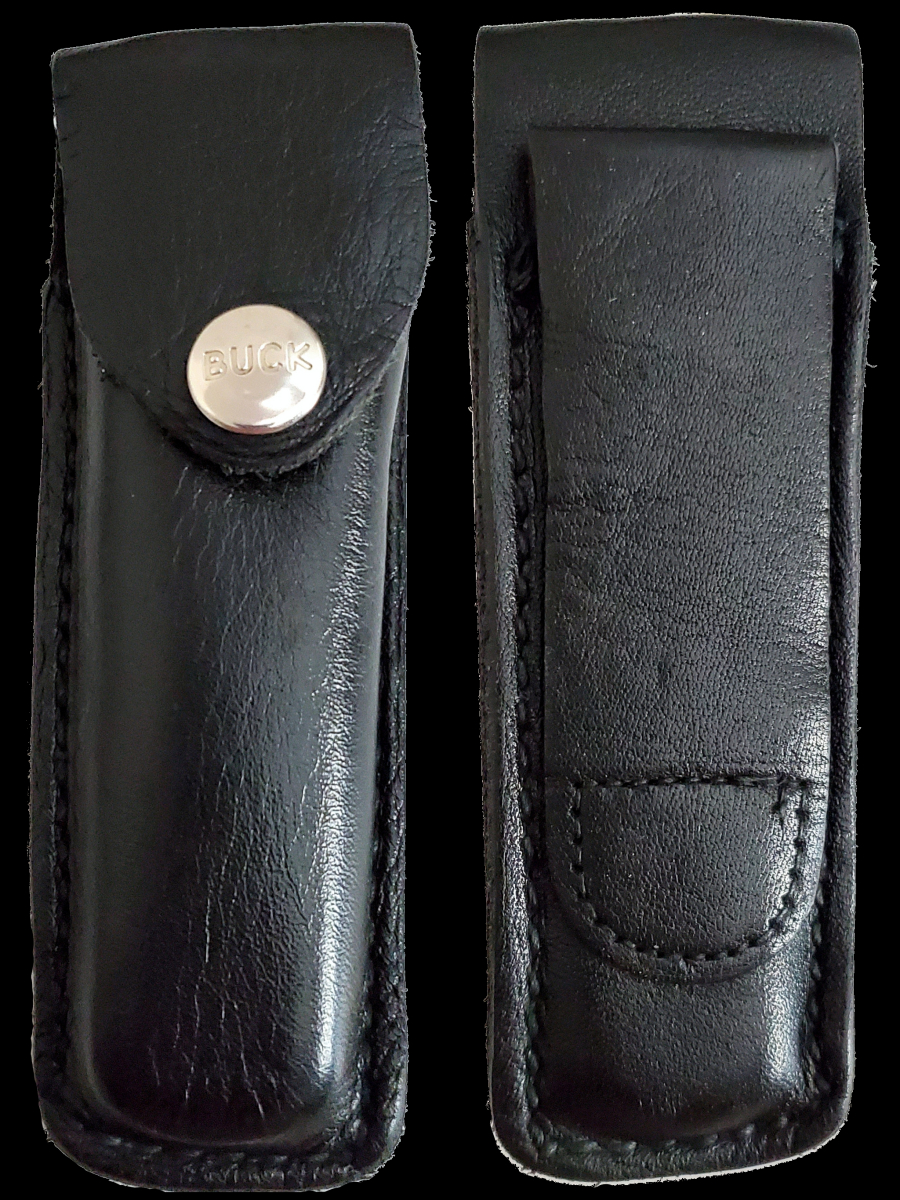 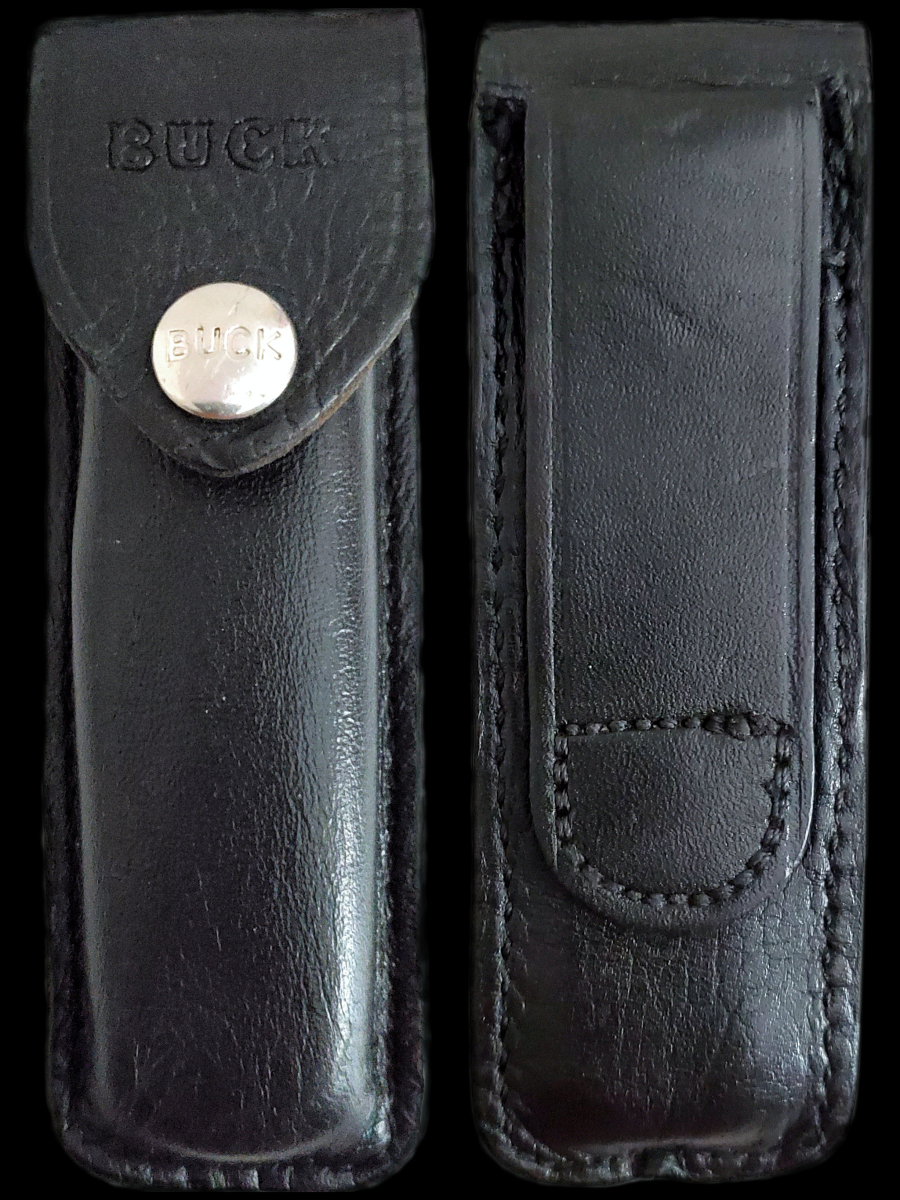
| 1964
- |
Angeles
Souvenir
Los Angeles, CA |
-
1967 |
|
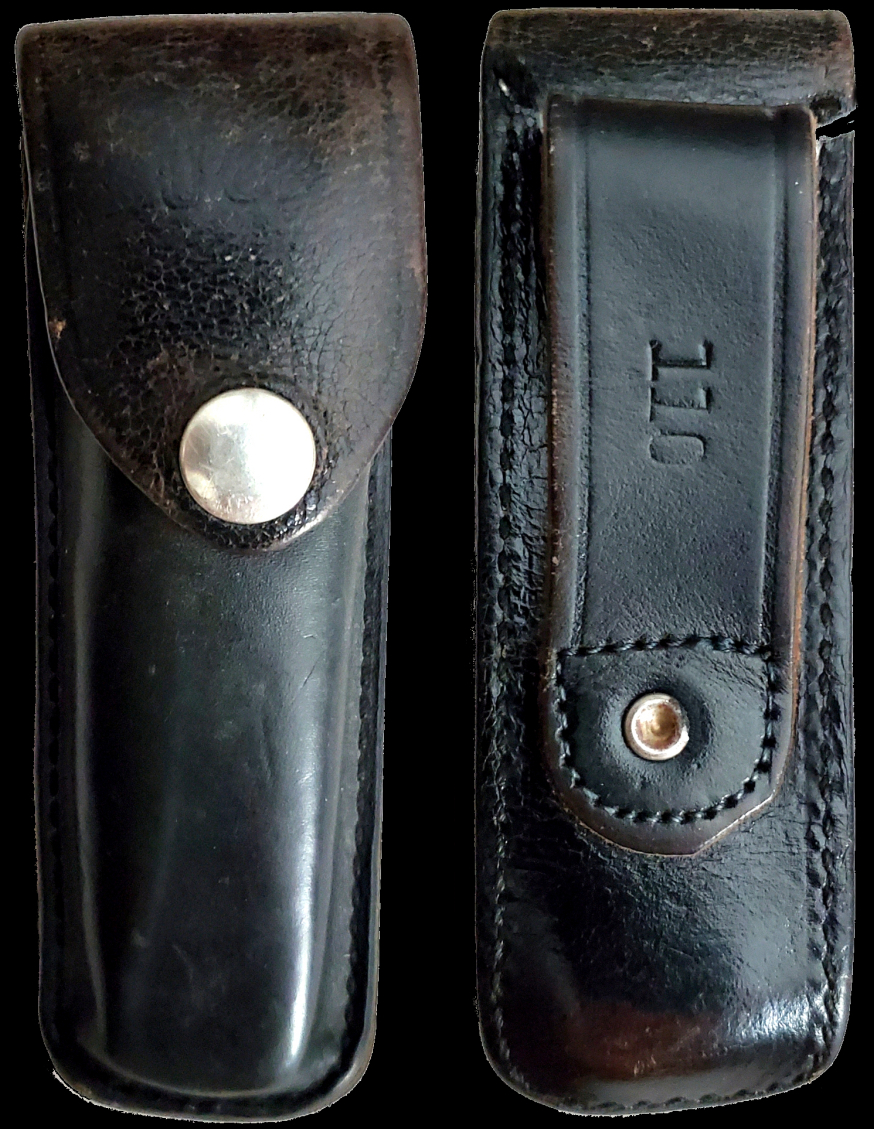
| 1967
- |
Atchison
Leather
Atchison, KS |
-
1969 |
|
|

|
Variation
Four (V3V4) 1968
- 1970
Blade
Rivet: 1 visible on both bolsters. ~ Butt Studs: 2
visible on left bolster only.
Inlay Pins: None. ~ Rocker Rivet: Brass, no head.
~ GS:V2T4
|
|
|
|

|
Variation
Five (V3V5) 1968
- 1970
Blade
Rivet: 1 visible on both bolsters. ~ Butt
Studs/Rivet: 3
visible on left bolster, 1 on right bolster.
Inlay Pins: 2 tiny, brass. ~ Rocker Rivet: Brass,
no
head.
|
|
|
|

|
Variation
Six (V3V6) 1968
- 1970
Blade
Rivet: 1 visible on both bolsters. ~ Butt Rivet: 1
visible on both bolsters.
Inlay Pins: 2 tiny, brass. ~ Rocker Rivet: Brass,
no
head.
|
|
|
|

|
Variation
Seven (V3V7) 1968
- 1970
Blade
Rivet: 1 visible on both bolsters. ~ Butt Rivet: 1
visible on both bolsters.
Inlay
Rivets: 2 standard sized, brass. ~ Rocker Rivet:
Brass, no head.
|
|
|

|
Shedua
Variation (V3V7S) 1968
- 1970
African Shedua wood was used in place of
Macassar Ebony for a limited time.
|
|

There
is no such wood called Sequa or Segua on the planet.
The actual wood used by Buck Knives, for a limited time, is
called Shedua.
|
|

|
Variation
Eight (V3V8) 1968
- 1970
Blade
Rivet: 1 visible on both bolsters. ~ Butt Rivets: 2
visible on both bolsters.
Inlay Pins: 2 tiny, brass. ~ Rocker Rivet: Brass,
may
be headed.
|
|
|

|
Shedua
Variation (V3V8S) 1968
- 1970
African Shedua wood was used in place of
Macassar Ebony for a limited time.
|
|
|

|
Variation
Nine (V3V9) 1968
- 1970
Blade
Rivet: 1 visible on both bolsters. ~ Butt Rivets: 2
visible on both bolsters.
Inlay Pins: 2 tiny, brass. ~ Rocker Rivet: Brass,
may
be headed. ~ GS:V2T5
|
|
|
|

|
Variation
Ten (V3V10) 1968
- 1970
Blade
Rivet: 1 visible on both bolsters. ~ Butt Rivets: 2
visible on both bolsters.
Inlay Pins: None. ~ Rocker Rivet: Brass, may be
headed.
|
|
|
1968 - 1969
San
Diego Paper Box Co. ~ 2 pieces, 2" tall
Same color and feel as 1964 -
1968
box. Boxes are shaped and glued, not
folded. |

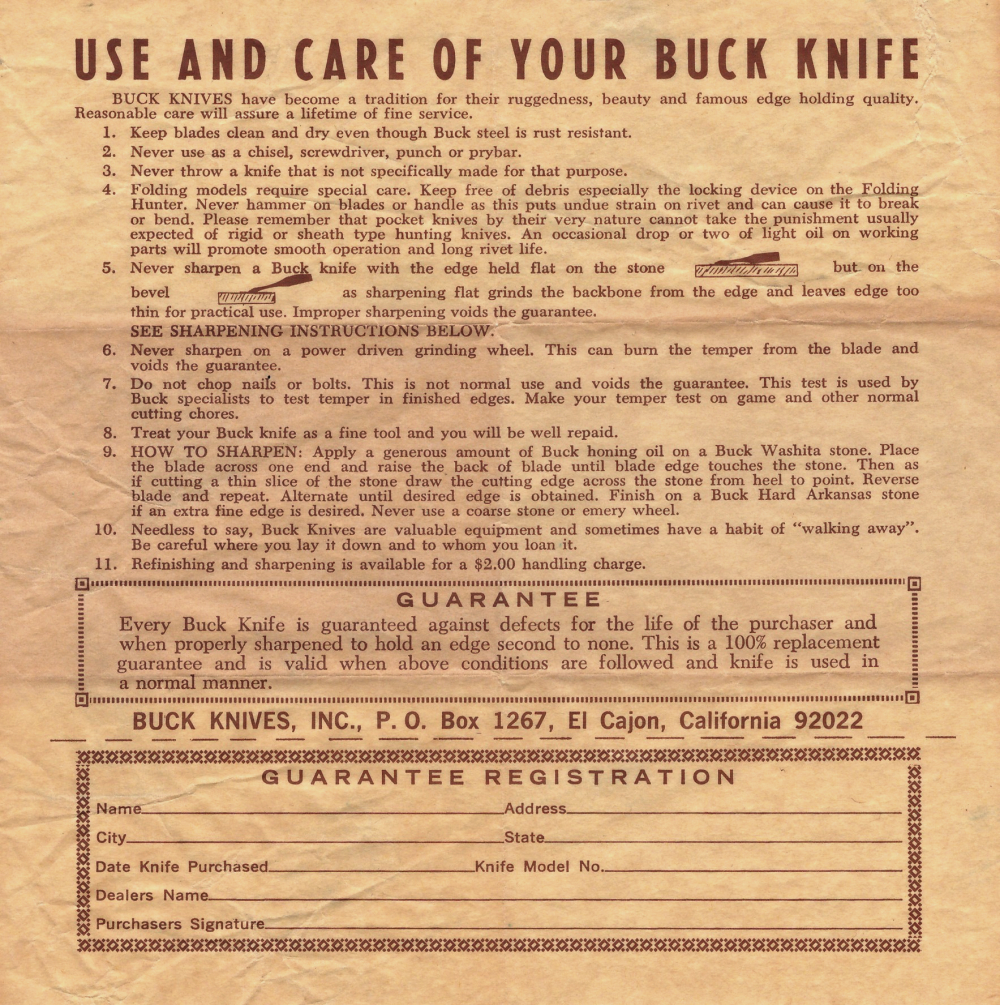
| 1969
- 1972 (PO Box 1267) |
|
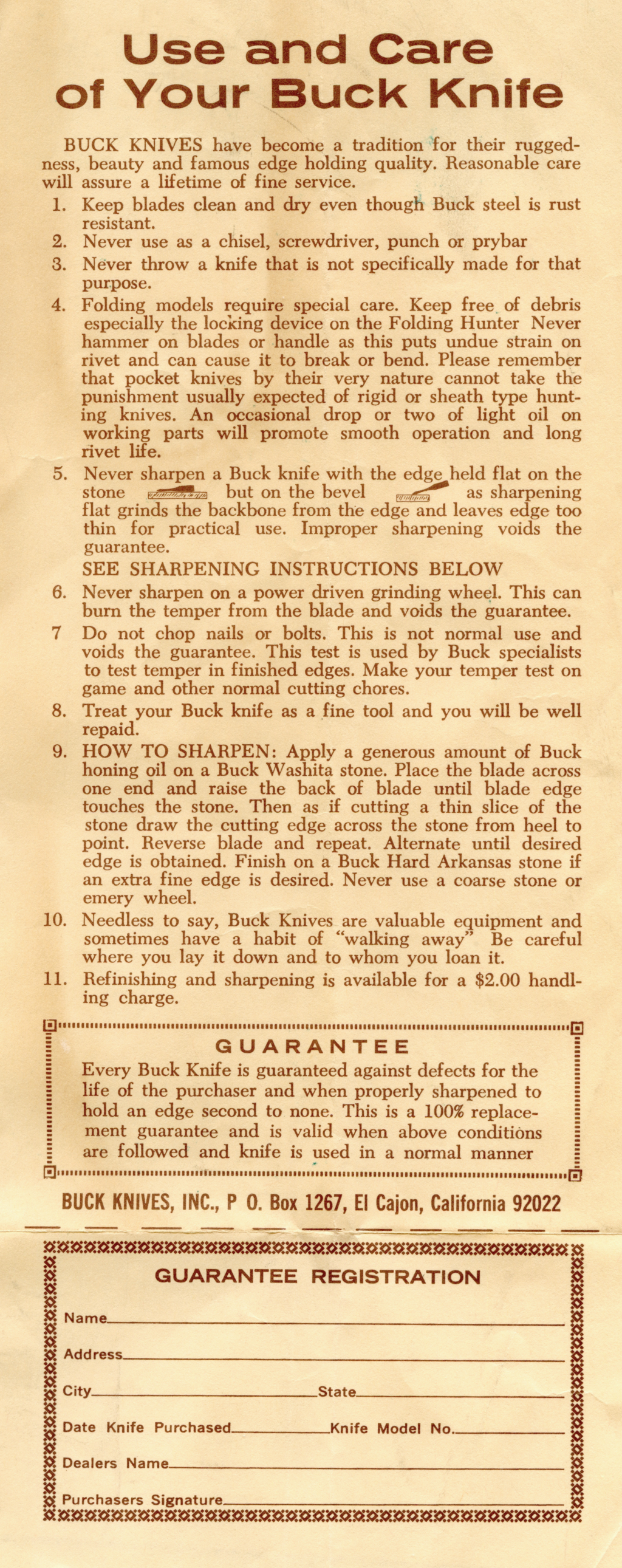
| 1969
- 1972 (PO Box 1267) |
|
The 'Use & Care' inserts,
as shown above, are printed with the new PO Box address that was
established to facilitate a smooth transfer of mail service over the
course of relocating to
the newly built factory at 1717 North Magnolia Avenue in El
Cajon, California.
After
settling in at the North Magnolia location, the inserts were
subsequently printed with
the 1717 North Magnolia address change. Shortly thereafter,
they returned to using the
PO Box address, as shown further below in the 1972-1973 dated inserts,
and continued
to make use of the PO Box address for the remainder of their time in
California.
|
1969 - 1970
Standard
Paper Box Corp, Los Angeles ~ 2 pieces, 2" tall
Tan glossy surface w/simulated
texture on the exterior and matching tray. |
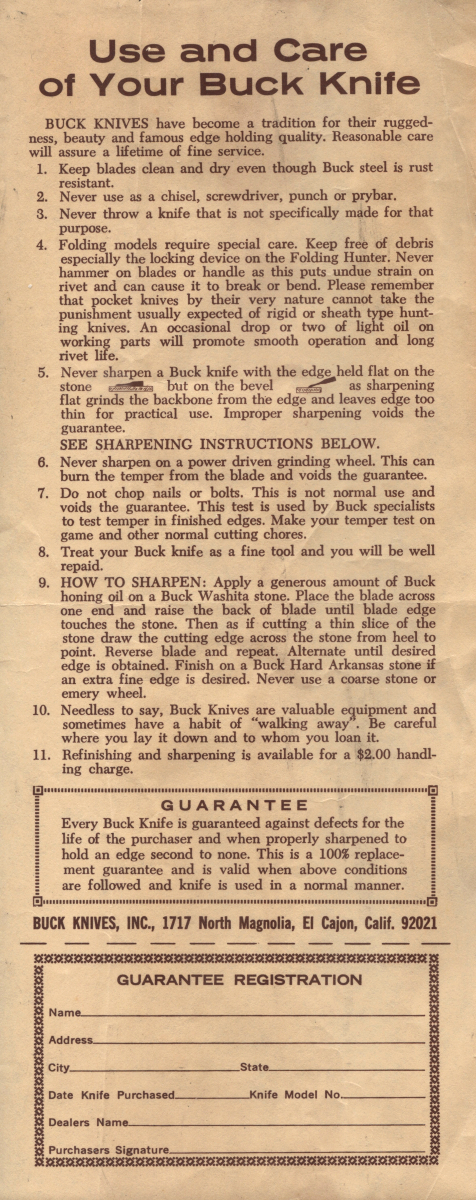
| 1969
- 1972 (1717 North Magnolia) |
|
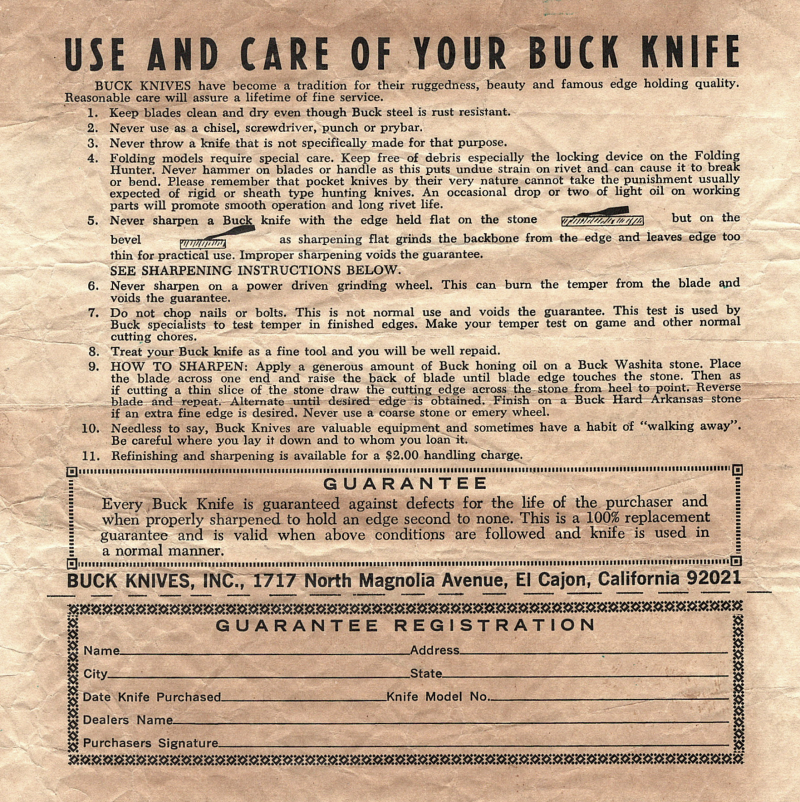
| 1969
- 1972 (1717 North Magnolia) |
 |

| 1967
- |
Atchison
Leather
Atchison, KS |
-
1969 |
|
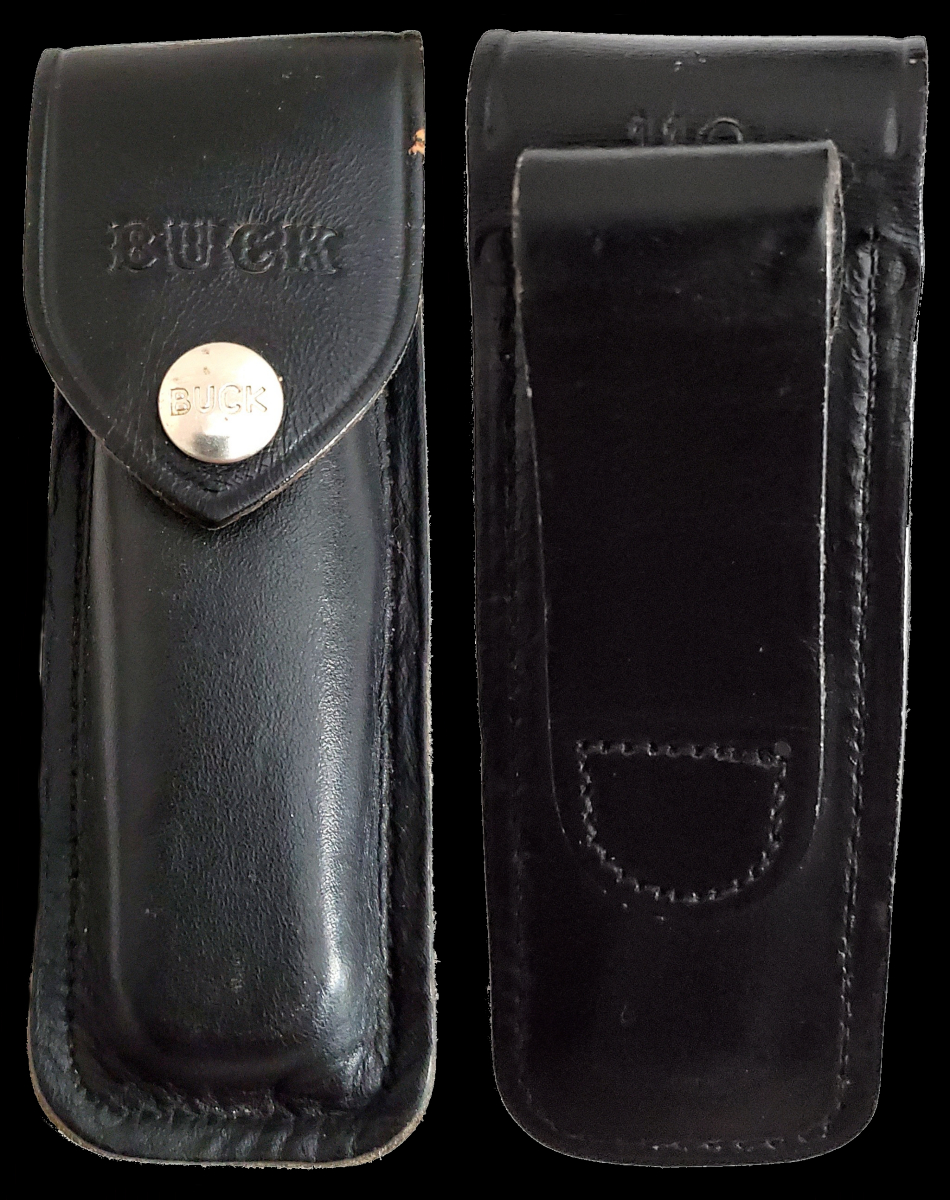
| 1969
- |
Buck
Leather Shop |
-
1972 + |
|
| **
All dates are approximate. There were no specific records
kept before date codes. ** |


Produced 1970 through 1972 while
located in the North Magnolia Avenue factory in El Cajon, California.
The
version
identifier is the 1/8" brass steel spring holder located between the
frames butt end
bolsters. The variation is identified by the two-line
inverted BUCK logo stamped on the left
side blade tang and the bolster rivet
locations listed below
each
knife.
These
frames
were the first forged in brass. The satin finished clip point blade is
made of
440C hand-rolled steel. The inlays are Macassar Ebony imported from
Indonesia.
|
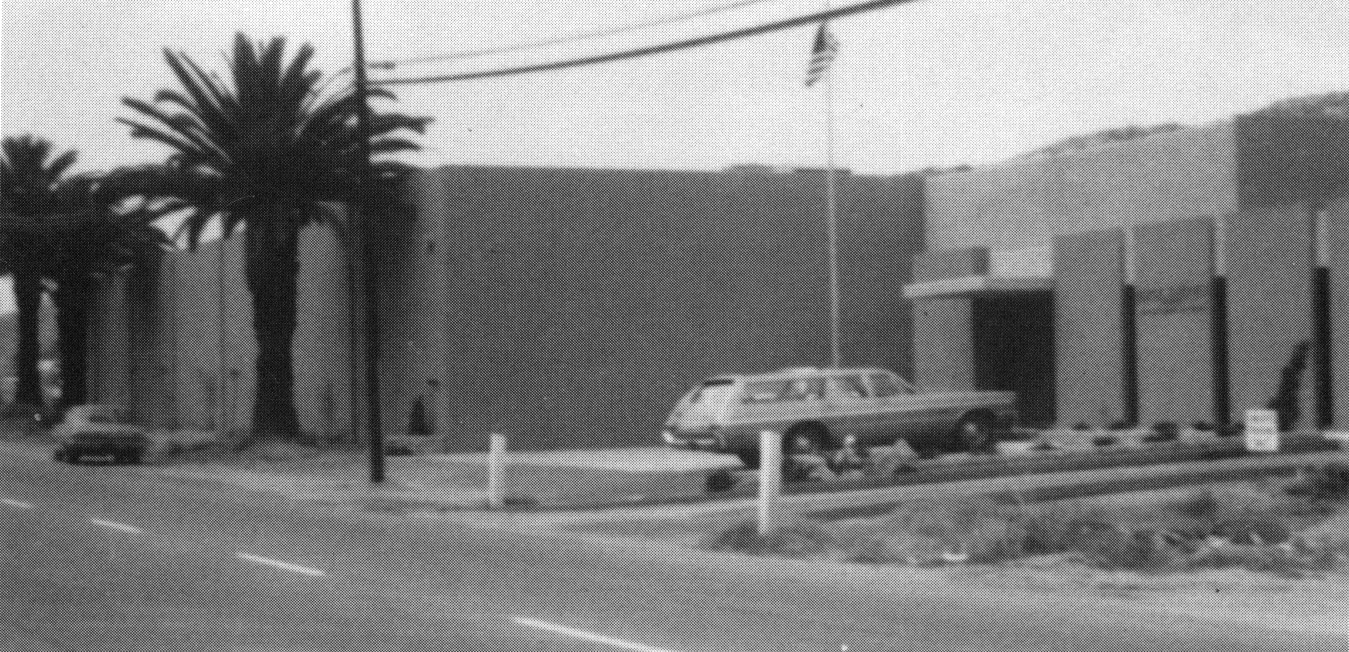
| North Magnolia Boulevard Factory |
|
|

|
Variation
One (V4V1) 1970 - 1972
Blade
Rivet: 1 visible on both bolsters. ~ Butt Rivets:
2 visible on both bolsters.
Inlay Pins: 2 tiny or small headed, brass. ~ Rocker
Rivet: Brass, may be headed. ~ GS:V3T1
|
|
|

|
Buckarta
Sample (Black Micarta) 1970
- 1972
|
|
|

|
Variation
Two (V4V2) 1970 - 1972
Blade
Rivet: 1 visible on both bolsters. ~ Butt Rivets: 2
visible on both bolsters.
Inlay Pins: 2 tiny or small headed, brass. ~ Rocker
Rivet: Stainless steel, headed. ~ GS:V3T2
|
|
|

|
Shedua
Variation (V4V2S) 1970
- 1972
African Shedua wood was used in place of
Macassar Ebony for a limited time.
|
|
 |
=> |
 |
|
Warning
insert was changed to Attention
A change made in preference of a less
ominous word.
|
1970 - 1972
San
Diego Paper Box Co. ~ 2 pieces, 2" tall
Creme glossy surface w/simulated
texture on the exterior and a white glossy interior tray. |
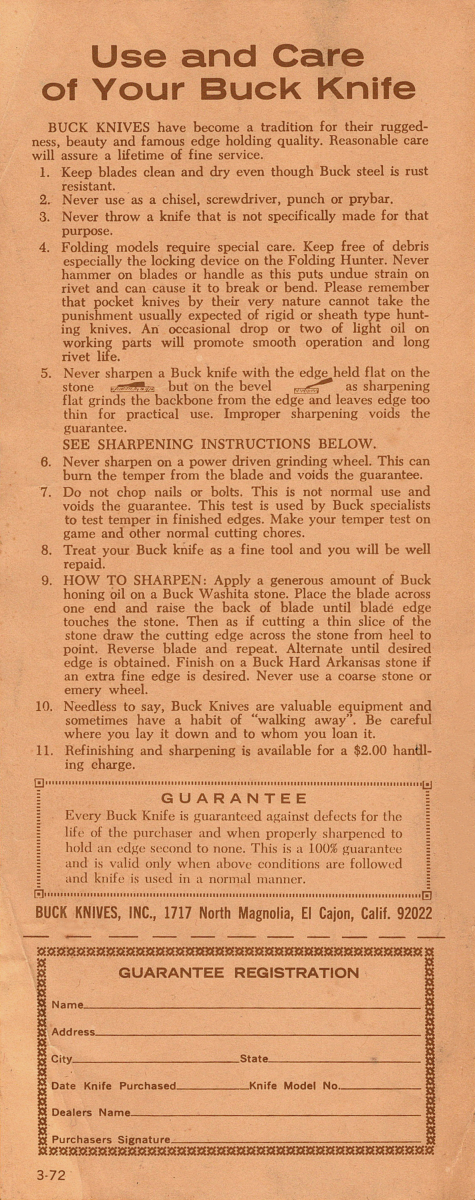
| 1972
- 1973 (First Date Code 3-72) |
|
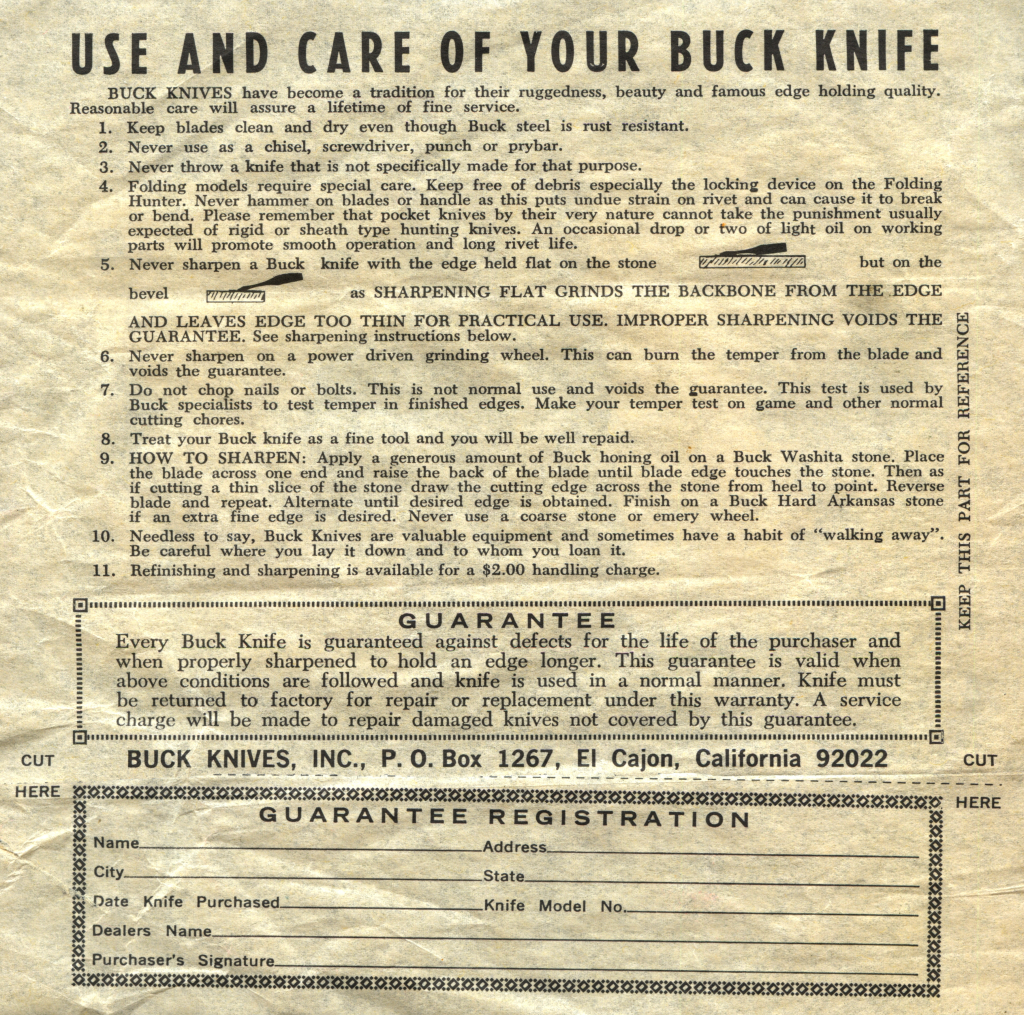
| 1972
(Line #5 capitalized and
text added to right margin) |

|
 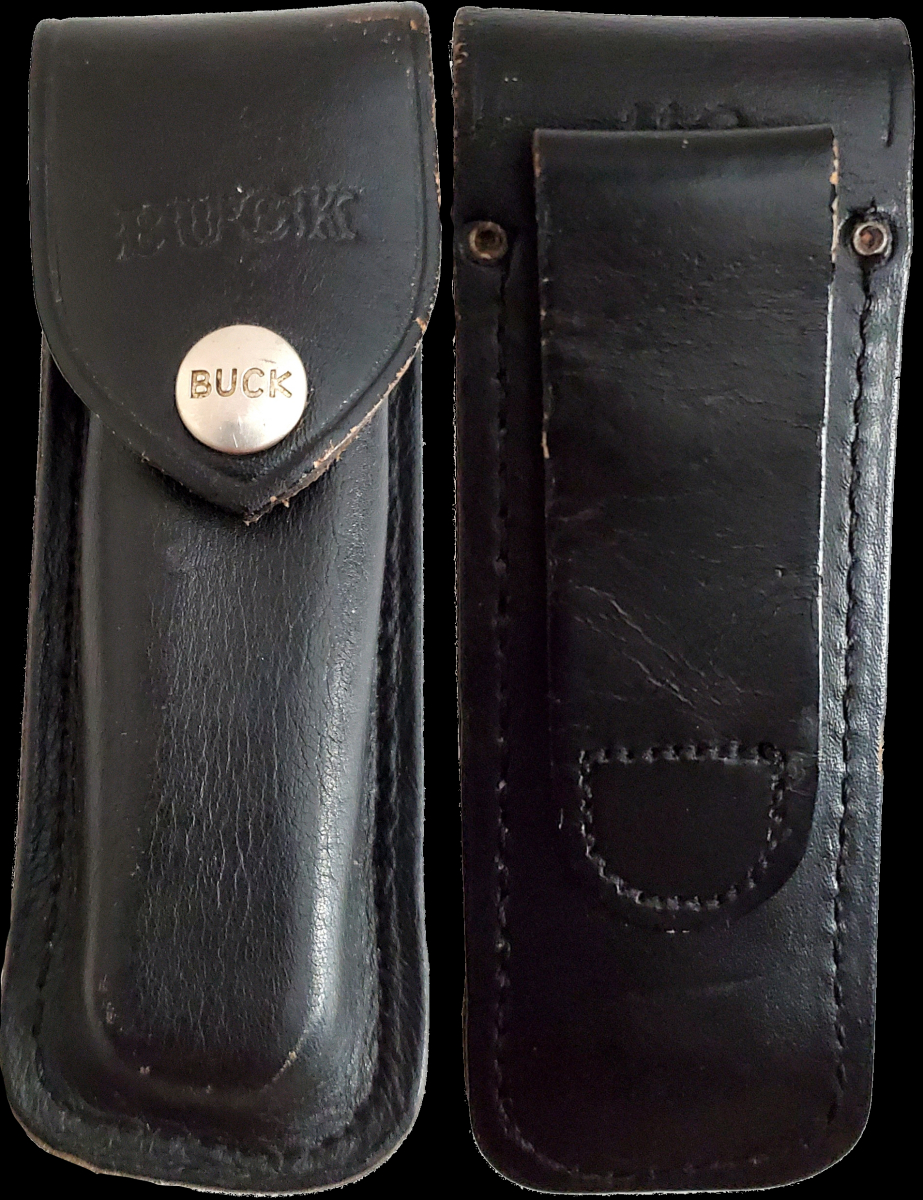
| 1969
- |
Buck
Leather Shop |
-
1972 + |
|
| **
All dates are approximate. There were no specific records
kept before date codes. ** |


Produced 1970 through
1980 while
located in the North Magnolia Avenue factory in El Cajon,
California.
The
version identifier is the 1/8" stainless steel spring
holder located between the frames butt end
bolsters. The variation is initially identified by the
inverted
two-line BUCK logo stamped on the left
side blade tang, the
110 model number makes its first appearance with the
addition of a third line in
1972. Further
version identification is made with the bolster rivet locations
listed below each knife.
The
frames were forged in brass until 1974, and with the first
'Two Dot' model, the frames are
now
sintered with powdered brass.
The
satin finished clip point blade is made of 440C hand-rolled
steel.
The inlays are Macassar Ebony imported from Indonesia.
|

| North Magnolia Boulevard Factory |
|
|

|
Variation
One (V5V1) 1970 - 1972
Blade
Rivet: 1 visible on both bolsters. ~ Butt Rivets:
2 visible on both bolsters.
Inlay Pins: 2 tiny, brass. ~ Rocker Rivet:
Stainless steel, headed. ~ GS:V3T3
|
|
|
|

Variation
Two (V5V2) 1972
Blade
Rivet: 1 visible on both bolsters. ~ Butt Rivets: 2
visible on both bolsters.
Inlay Pins: 2 tiny, brass. ~ Rocker Rivet:
Stainless
steel, headed. ~ GS:V3T5 |
|
|
|

|
Variation
Three (V5V3) 1972 - 1974
Blade
Rivet: 1 visible on both bolsters. ~ Butt Rivets: 2
visible on both bolsters.
Inlay Pins: 2 small headed, brass. ~ Rocker Rivet:
Stainless steel, headed. ~ GS:V3T4
|
|
|
|

|
Variation
Four (V5V4) 1974
Blade
Rivet: 1 visible on both bolsters. ~ Butt Rivets: 2
visible on both bolsters.
Inlay Pins: 2 small headed, brass. ~ Rocker Rivet:
Stainless steel, headed.
V3/V4 grind plunge line with a V5 kick.
|
|
|
|

|
Variation
Five (V5V5) 1974
Blade
Rivet: 1 visible on both bolsters. ~ Butt Rivets: 2
visible on both bolsters.
Inlay
Rivets: 2 small headed, brass. ~ Rocker Rivet:
Stainless steel, headed. ~ GS:V4T1
|
|
|
1972 - 1977
San
Diego Paper Box Co. ~ 2 pieces, 2" tall
Creme matte surface w/simulated
texture on the exterior and a white matte interior tray. |
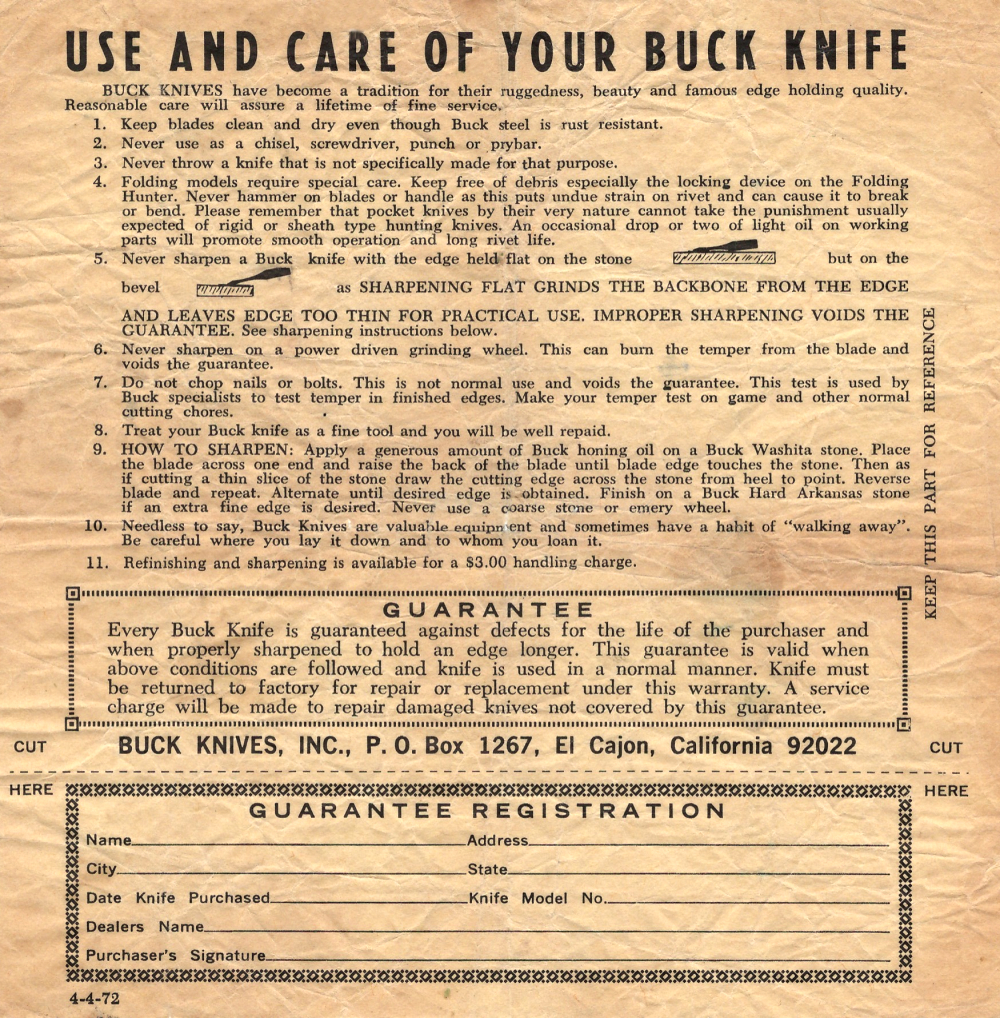
| 1972
- 1973 (First Date Code 4-4-72) |

|
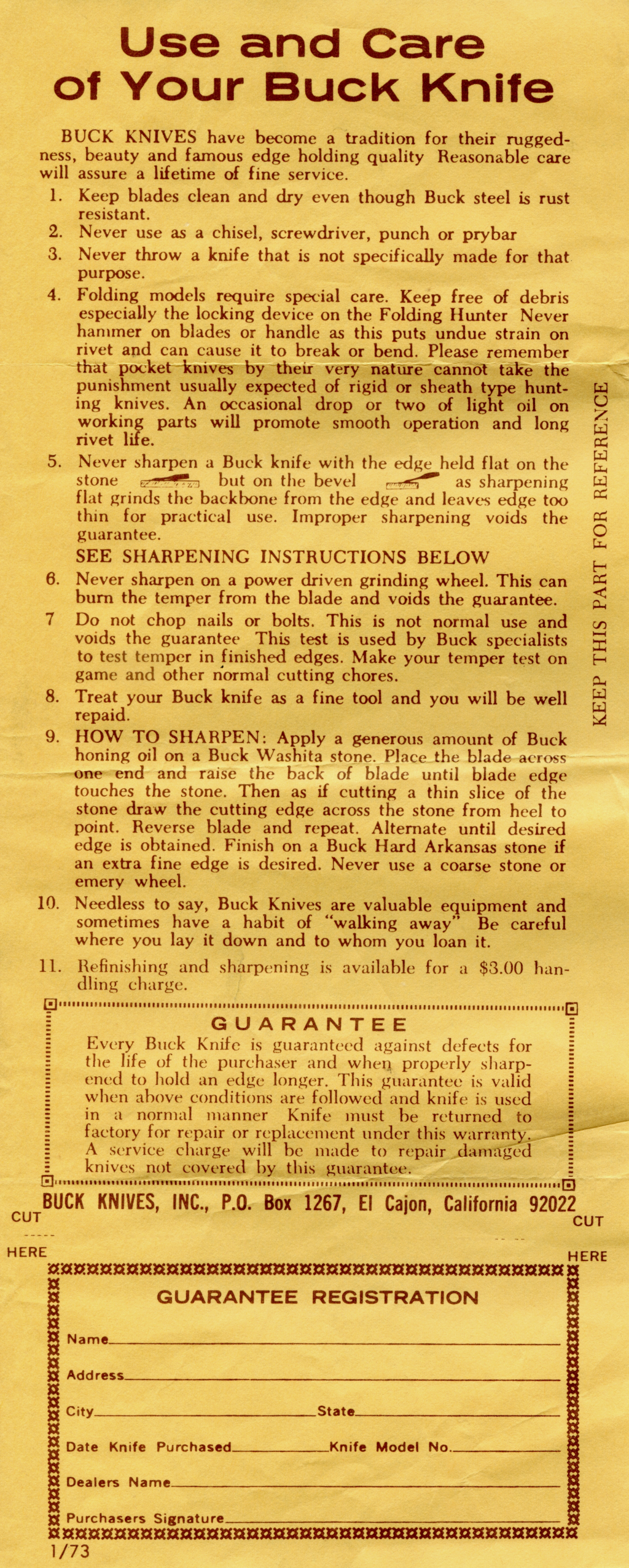
|
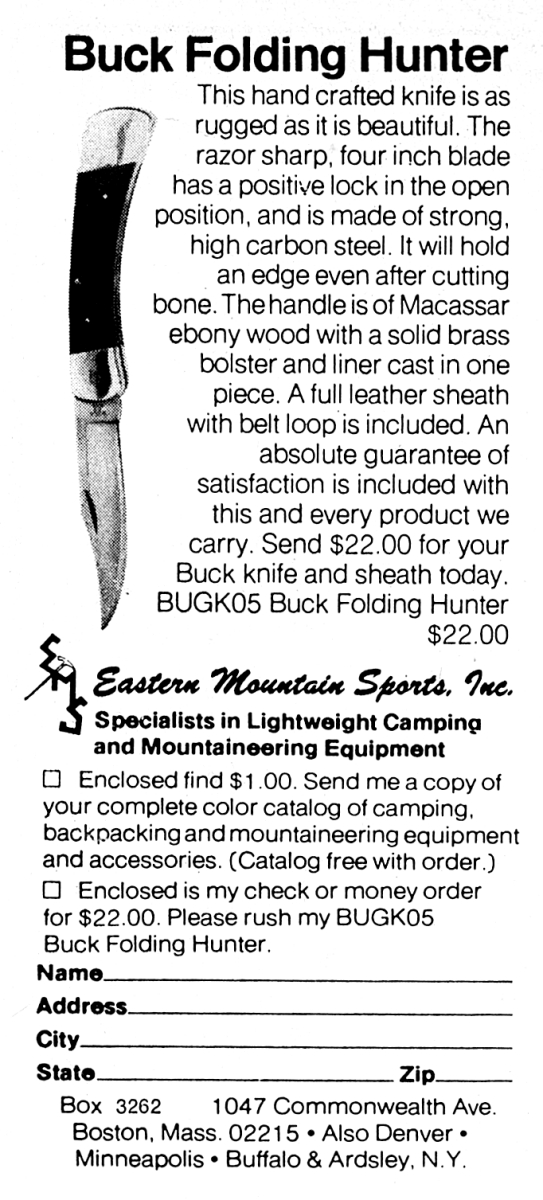 |
 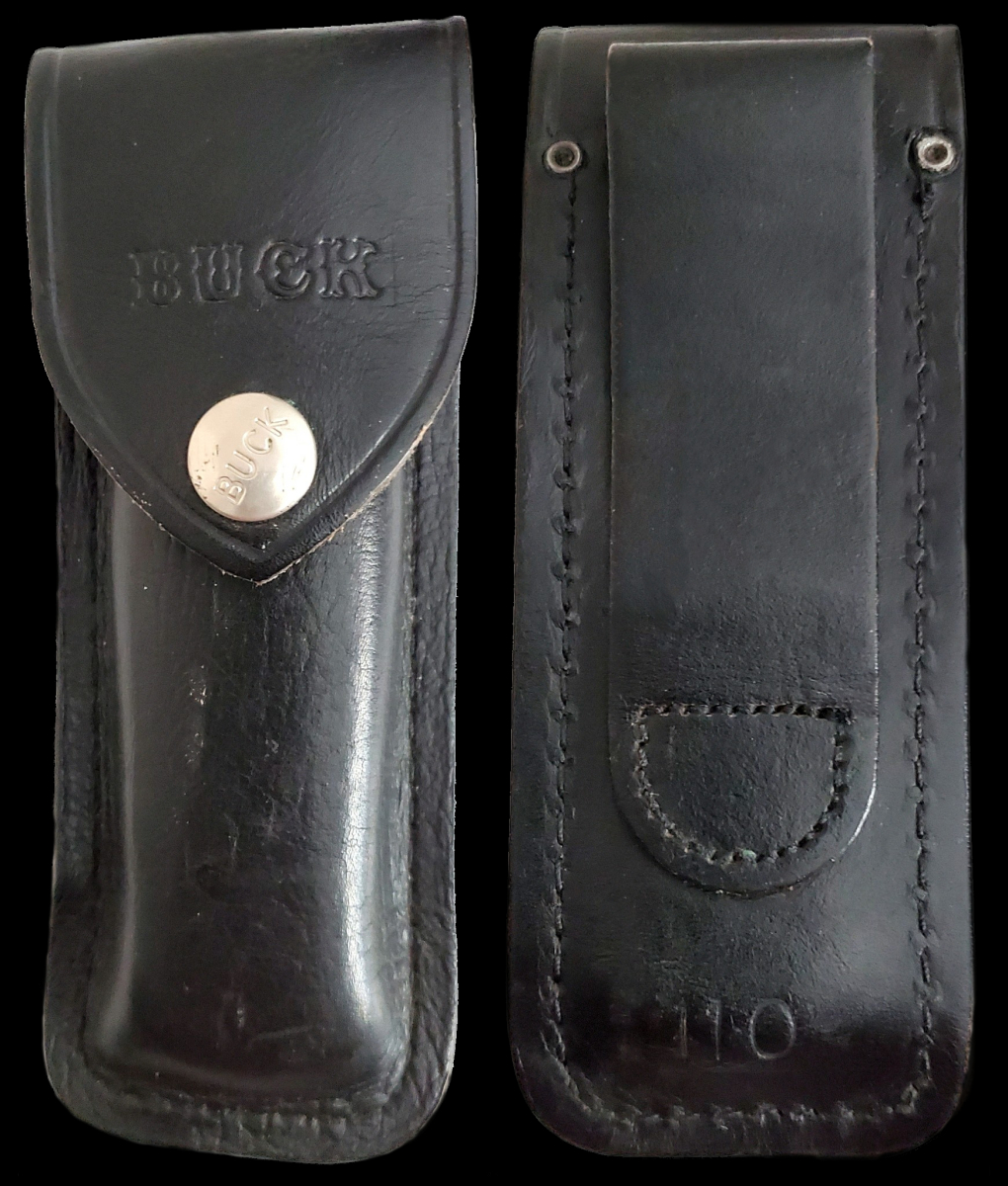
| 1972
- Buck
Leather Shop -
1976 |
|
|

|
Variation
Six (V5V6) 1974 - 1977
Blade
Rivet: 1 visible on both bolsters. ~ Butt Rivets: 2
visible on both bolsters.
Inlay
Rivets: 4 small headed, brass. ~ Rocker Rivet:
Stainless steel, headed. ~ GS:V4T2
|
|
|
|

|
Variation
Seven (V5V7) 1974 - 1977
Blade
Rivet: 1 visible on both bolsters. ~ Butt Rivets: 2
visible on both bolsters.
Inlay Pins: 3 small headed, brass. ~ Rocker Rivet:
Stainless steel, headed. ~ GS:V4T3
|
|
|

| The Al Buck inserts began in 1976 |
|
|

Variation Eight (V5V8) 1977
- 1980
Blade
Rivet: 1 visible on both bolsters. ~ Butt Rivets: 2
visible on both bolsters.
Inlay
Rivets: 3 large headed, brass. ~ Rocker Rivet:
Stainless steel, headed. ~ GS:V4T4 |
|
|
|

|
Variation
Nine (V5V9) 1977 - 1980
Blade
Rivet: 1 visible on both bolsters. ~ Butt Rivets: 2
visible on both bolsters.
Inlay
Rivets: 3 large headed, brass. ~ Rocker Rivet:
Stainless steel, headed.
Elongated BUCK logo.
~ Butt end inlay rivets nearer to centerline.
|
|
|

|
Rosewood
or Shedua
Variation Nine (V5V9S) 1977
- 1980
African Shedua wood was used in place of
Macassar Ebony for a limited time.
|
|
1977 - 1980
San
Diego Paper Box Co. ~ 1 piece clamshell, 2" tall |
1977 - 1980
San
Diego Paper Box Co. ~ 1 piece clamshell, 2" tall |
 
| 1976
- Buck
Leather Shop -
1980 + |
|
Custom
Blade Etching
Part I
Electro-Etching
Around 1977, Buck
Knives are starting to appear displaying custom blade logos from various
corporate entities.
This is a new custom feature being offered behind the scenes through
Buck
direct sales
representatives. They are using an Electro-etching method to create
these permanent logos on the blades.
Some come with a matching embossed sheath.
Many are created for Promotional use, Safety Awards, and Anniversaries.
Just to name a few that can be found from 1977 to 1980.
Champion (Spark Plugs) ~ Monroe (Automotive
Suspension)
North American Hunting Club ~ Energy Development Co
< OEC >
I am currently researching
the details on this subject.
Will have more information and photos soon.
|

|
Early
Electro-etch Sample (V5V9) 1977
- 1980
Champion Spark Plugs
|
|

|
Early
Electro-etch Sample (V5V9) 1977
- 1980
Blah, Blah, Blah.
|
|
Literature
ID Codes
As you will
discover, there are no specific years printed on some of
the different literature distributed by
Buck over the last 15 years. In the early 1980s,
the different paper inserts placed inside Buck Knife boxes,
along with
the consumer guide pamphlets and catalogs found at retail locations,
started displaying a code
number from the marketing department
for the printers. It was generally found on the
front bottom left
or right corner of the
single-sided paper, and on the reverse side of pamphlets,
as well as the back
cover of catalogs,
again, in the bottom left or right corners.
In the images below,
you will
find a breakdown of the codes to help
identify the item you have in hand.
|
| **
All dates are approximate. There were no specific records
kept before date codes. ** |



All
Buck Knives materials, text, and images used on this
website are copyrighted and/or
trademarked to the respective rights holders of said
images, text
or logos.
All Buck Knives copyrighted and/or trademarked material is used by
permission, and may
not be copied or disseminated without written authorization from Buck
Knives, Inc.
Buck Knives, Inc.
©/®
1961 - 2020+
All
personally created materials, text, and images used on this
website are copyrighted
to this website owner or the respective rights holders of said
images, text
or logos.
Images
and/or content cannot be used without written authorization from the
website owner.
Michael
DF Lowe, ©2020+
Website created and maintained
by Michael DF Lowe, November 2020
This
website is run by a collector of the Buck 110 Folding Hunter.
I am not a
current, or former employee of Buck Knives, Inc. |
|


























